- Krabstadt Education Center: Conflated Places In dialogue: KEC and TTTToolbox
- L’Art d'apprendre. Une école des créateurs Presentation of Teaching to Transgress Toolbox
- Motgiftet #3 Teaching to Transgress Toolbox’s “Who is in the classroom?”
- Who is in the Classroom? A workshop towards inclusion and diversity
- Undoing the institution (a person at a time) Public Talk with Teresa Cisneros
- Tour de Pronom Workshop
- Friendly Peer-Review Sessions
- Self-organized working groups sessions
- Public conversation, Pédagogie critique en école d’art December 1 — 3, 2020
- Sharing practices and tools on critical pedagogy Work Session November 16 — 20, 2020
- Sparring Partners Work SessionJune 6 — 10, 2020
- Forming Ties Public Get-together
- Work Session: How to Say it? January 27 — 31, 2020
- Selecting Participants October – November 2019
During the TTTToolbox programme, we developed and tested a series of methods for working on the creation of more inclusive classrooms. We shared these approaches in workshops and other events at art exhibitions, activist spaces, universities, and art schools. Some were teaching, study, workshop, or research situations within the TTTT group(s) (the one-week work sessions, for example) and some were outward facing or public events. We hope both will be applicable in many other contexts for people concerned with this issue. This page is a catalogue of the activities we ran until June 2022.
We hope that you find here inspiring ideas and tools. Keep us posted in case it is of use to. And if you want to be informed about upcoming TTTT activities, do email us at contact[@]ttttoolbox.net
Krabstadt Education Center: Conflated Places In dialogue: KEC and TTTToolbox
17 June 2022, 16:00 — 18:15
@PARSE journal, issue #14, online
hosted by Ewa Einhorn, Jeuno JE Kim, Karolin Meunier
Part of the launch of PARSE journal, issue #14 Krabstadt Education Center: Conflated Places this conversation addresses tools, conflicts and access to education linking the KEC universe (Jeuno JE Kim) to TTTToolbox (Eva Weinmayr). Krabstadt Education Center (KEC) is based in Krabstadt, a fictional town in the Arctic where the Nordic Countries have sent their unwanted people and problems. Recently, Krabstadt has absorbed an influx of unemployed artists with PhDs, burned-out artist-teachers/teacher-artists, and institutionally stuck creatures... Read more
L’Art d'apprendre. Une école des créateurs Presentation of Teaching to Transgress Toolbox
25 March 2022, 9:00 — 18:00
@Pompidou Metz, 1 Parv. des Droits de l'Homme, 57020 Metz
Facilitated by Alex Eguiluz and X. Gorgol
Hosted by the University of Lorraine (CREM) in France, the study day for people working in alternative pedagogical contexts in art education took place, in English and in person, in the framework of the exhibition “L’Art d'apprendre. Une école des créateurs” at the Centre Pompidou-Metz. Read more.
Motgiftet #3 Teaching to Transgress Toolbox’s “Who is in the classroom?”
10 March 2022, 19:00 — 21:00
@Kolgruvegatan 12, 41707 Göteborg
Hosted by Status Queer (Inga Kolbrun Söring, Sam Message)
The event is in English and in person.
This event, hosted by Status Queer at Gothenburg, was a series of exercises on creating safer teaching spaces, with particular focus on trans inclusivity. Read more
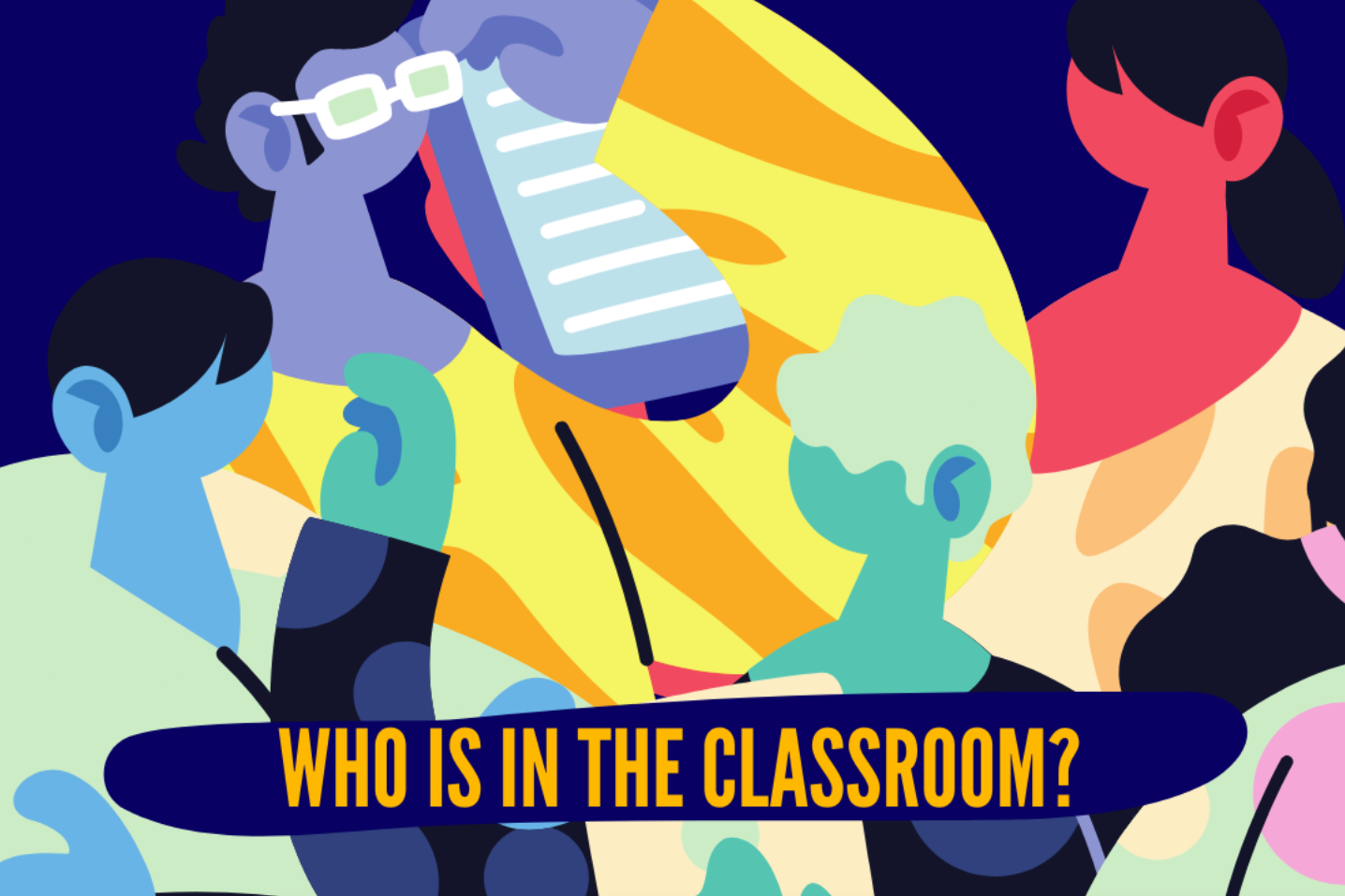
Who is in the Classroom? A workshop towards inclusion and diversity
8 March 2022, 18.00 — 19:30, online
Facilitated by Åke Sjöberg, Inga Kolbrun Söring, Eva Weinmayr
Organized by Alex Eguiliz and Nico Steinik
@ Learning Planet Institute, 8 Bis Rue Charles V, 75004 Paris
This workshop at the Learning Planet Institute was addressed to students, teachers, researchers, administrators, cleaners, technicians, and managers curious about how to facilitate more inclusive classrooms. See Who is in the classroom. Read more
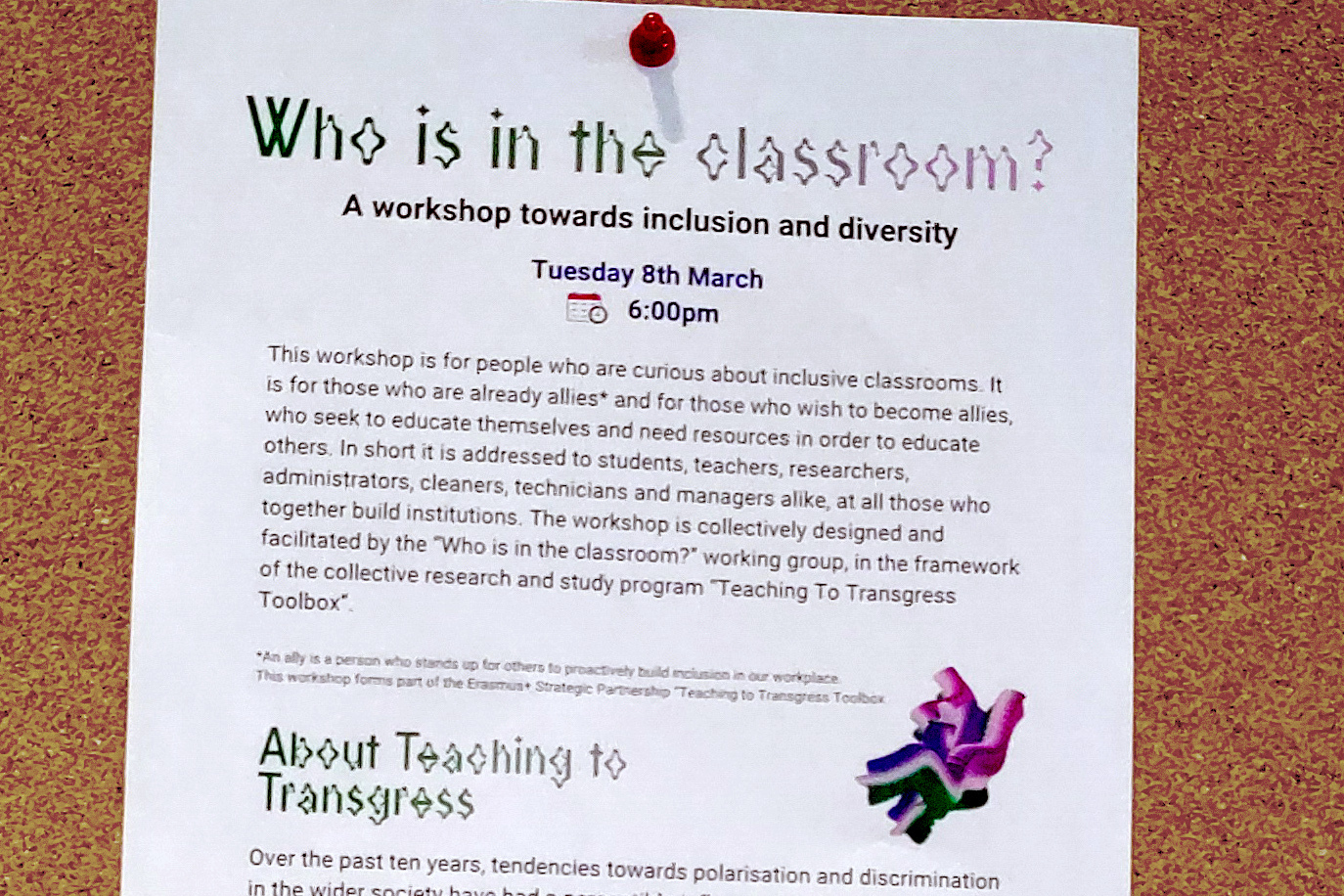
Undoing the institution
(a person at a time) Public Talk with Teresa Cisneros
10 December 2021, 10:00
Organized by Laurence Rassel and Eva Weinmayr
@ erg, rue du Page 87, 1050 Brussels, and streamed online
In this public talk about the power of policy and behavioural change, London-based curator and cultural worker Teresa Cisneros spoke about her role as an administrator employed to create “change” and to make institutions more equitable and just. She asked in this talk, “What does it mean for a body like mine to be inside the belly of the beast? What do I expect from it, and what does it expect from me?
Tour de Pronom Workshop
29 September 2021, 14:00 — 16:00
Facilitated by Flo*Souad Benaddi
@ Villa Arson, 20 Avenue Stephen Liegeard, 06105 Nice
This workshop for staff at the art school, Villa Arson, introduced the rationale and importance of pronoun go-rounds in educational settings. It provided guidance on how to facilitate rounds and how to take care of the situation afterwards. See Who is in the Classroom.
Friendly Peer-Review Sessions
During May — June 2021, online
These friendly peer review sessions were organized to invite critical feedback from readers both inside and outside the project. They served to get a perspective different from that of the people who researched and produced the pieces. The fresh look from the invited “reviewers” helped to improve the works, mostly on a practical level, asking: Is the writing accessible? Is the structure helpful to navigate the document? Does the reader get enough context about the piece? Are there any other references that could inform and support the work?
The goal of these reviews was to get the publication platform, and its many pieces, to be a place that would be hospitable to the reader.
Self-organized working groups sessions
December 2021 — June 2021, online, and locally in-person
In the first half of 2021, when Europe was still under lockdown, the individual working groups organized themselves and kept meeting online to create and edit their respective contributions to the TTTToolbox publishing platform. Through these regular meetings in smaller working groups, we were able to support one another, establish a routine in the socially deprived lock-down life and develop and elaborate ideas and content for the publishing platform.
Public conversation, Pédagogie critique en école d’art December 1 — 3, 2020
@Villa Arson, online
A public conversation inviting teachers and students from different art schools in France to a three-day seminar about critical pedagogy in the arts, jointly developed with the art school Villa Arson in Nice, France, it served as an opportunity for some TTTToolbox working groups to share and test workshop methods. Download public programme PDF.
Thursday, December 3, 2020
Workshop, Bingo GGGO
16:00 — 18:00, online
Hosted by Camille Circlude, Chloé Elvezi, Martha Salimbeni and ReussMaureen
With guests Céline Chazalviel, Solène Collin, Enz@ Le Garrec, Chloé Stevenoot, Daphné Targotay and Elsa Abderhamani
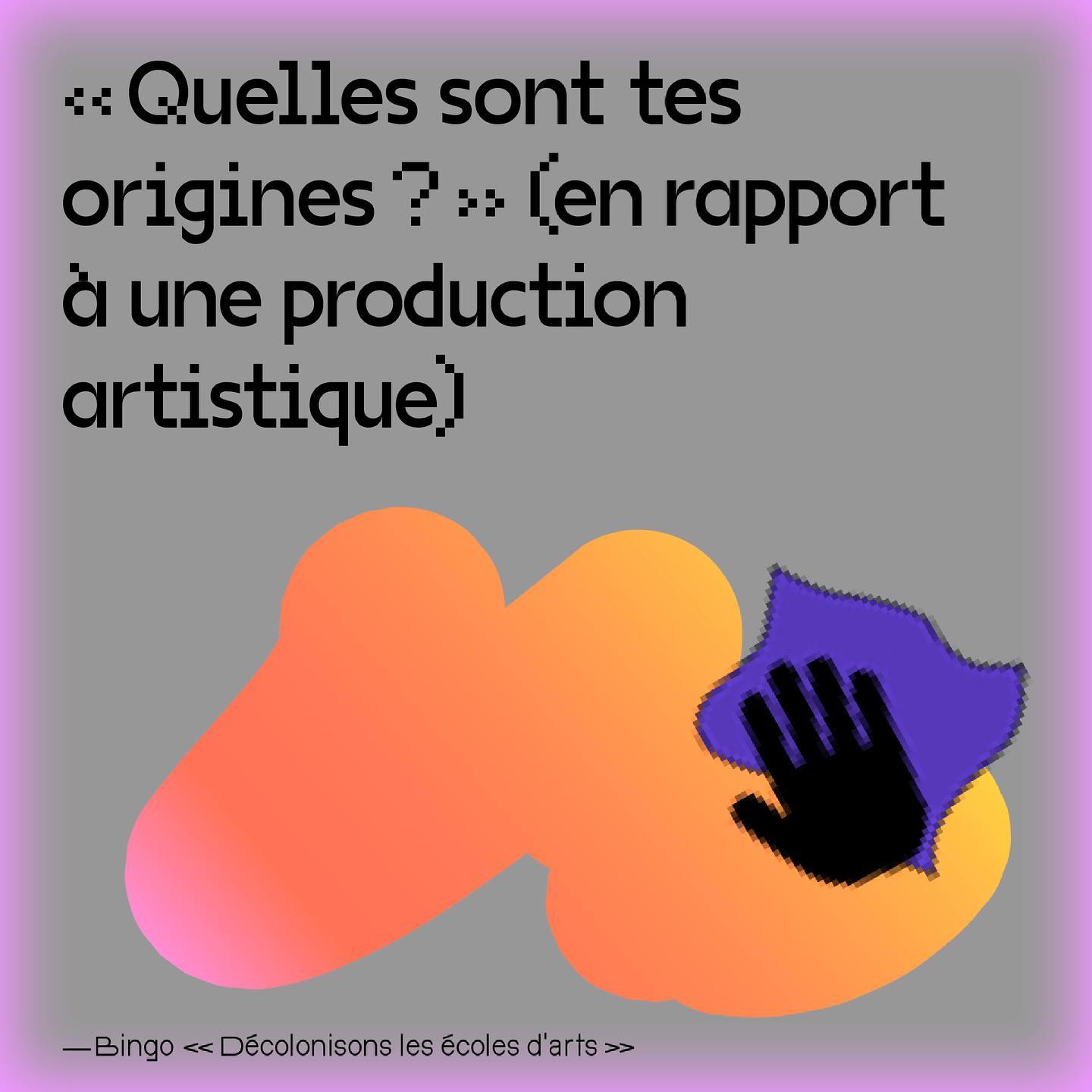
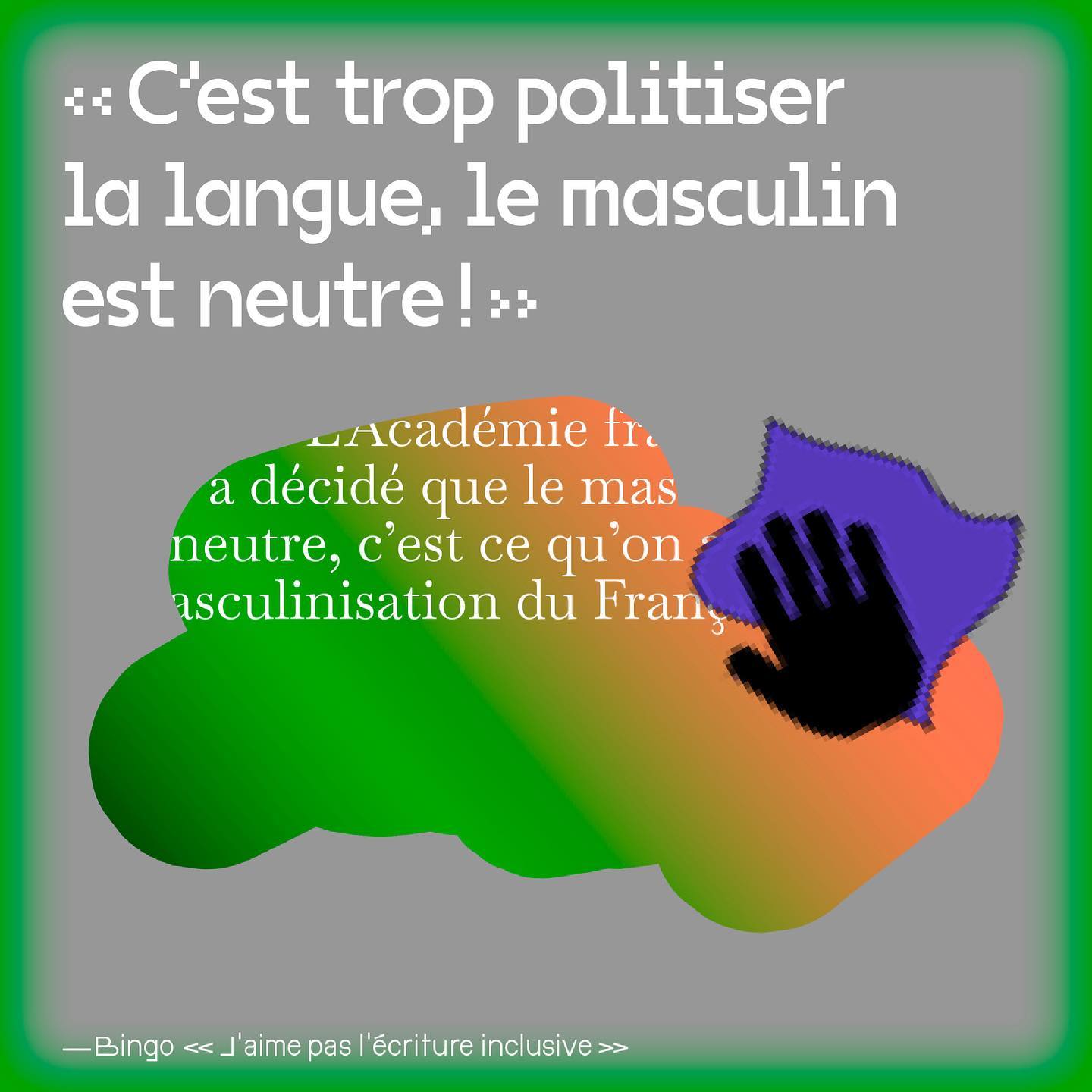
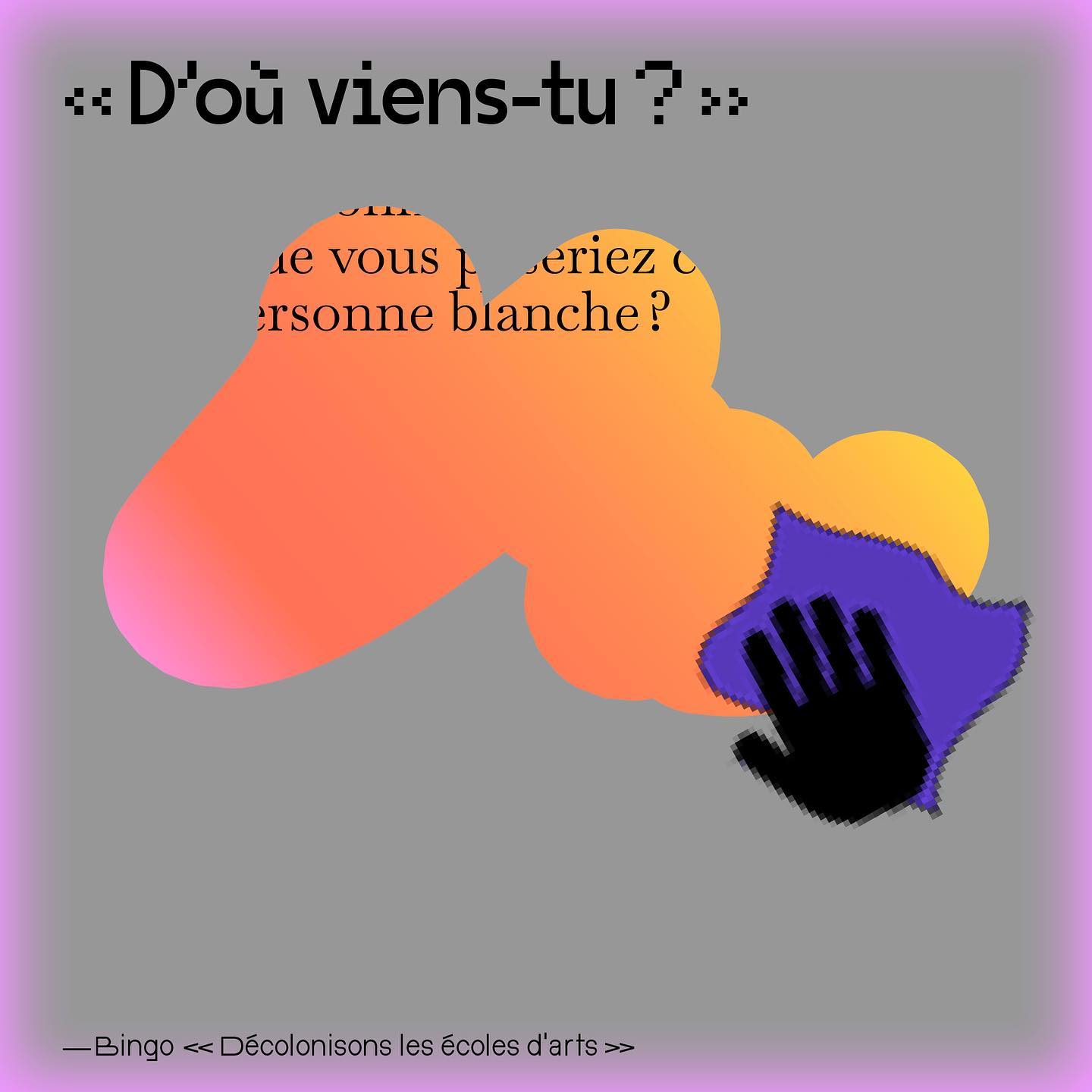

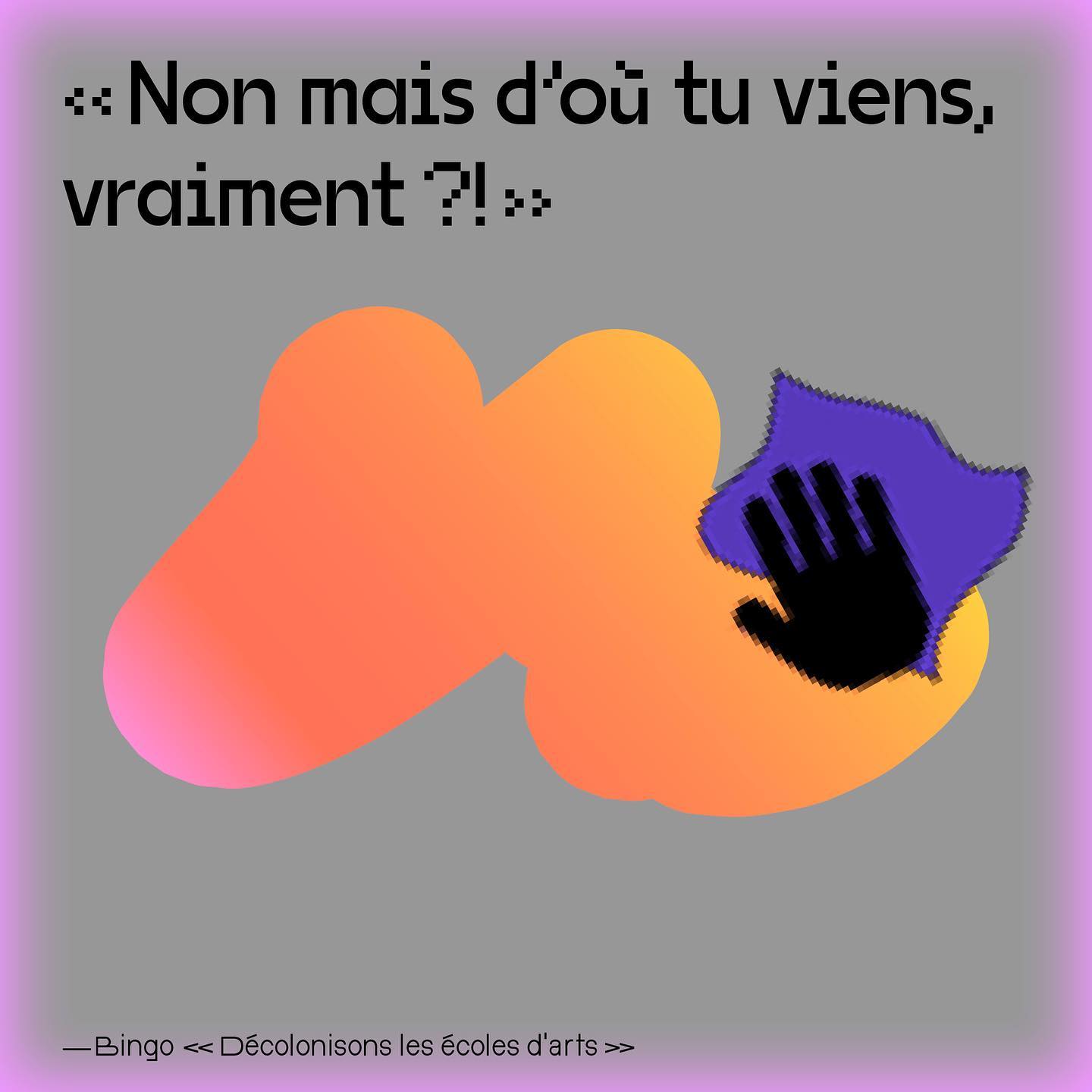
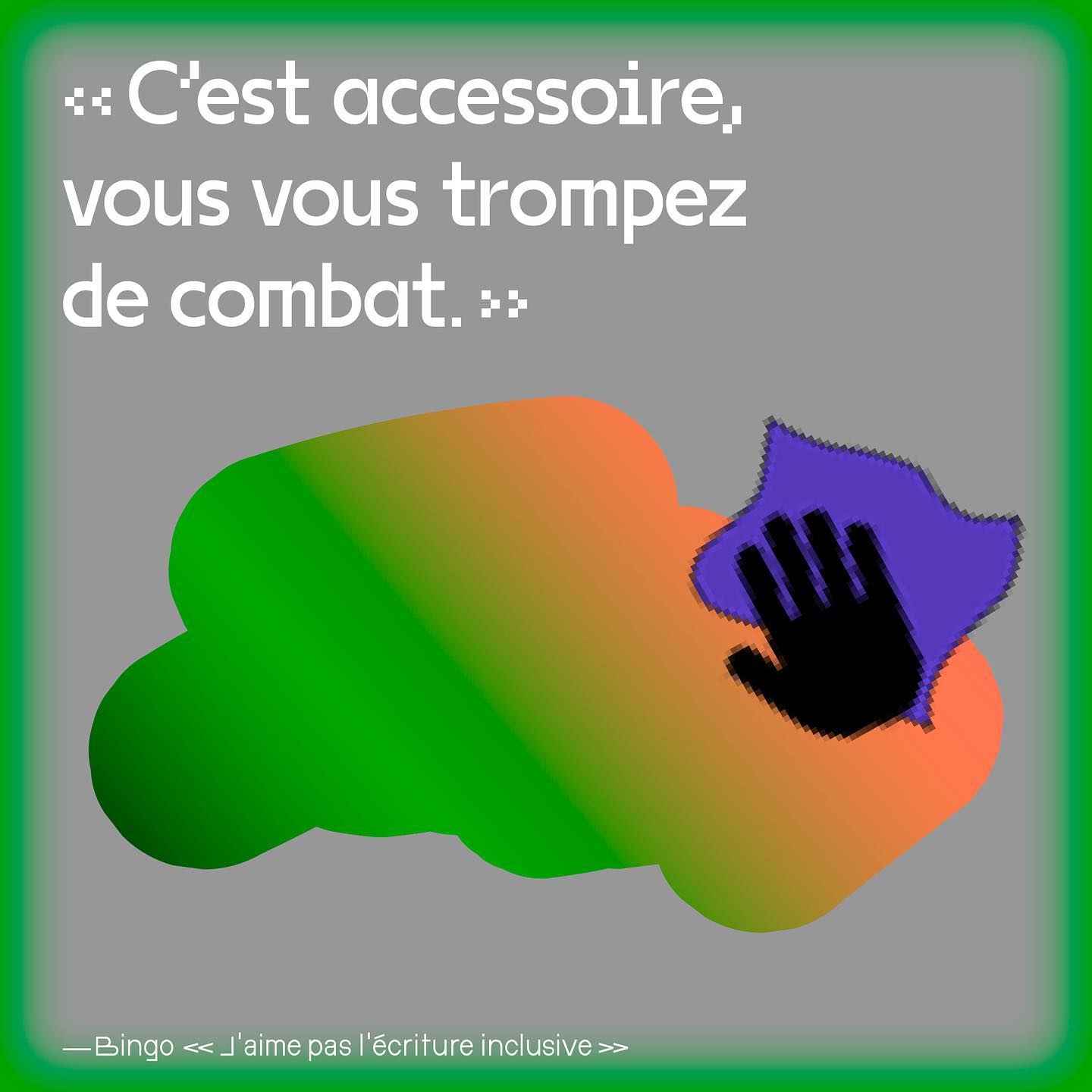
Based on the existing “Not Racist” and “Not Sexist” Bingos, the Language as Virus working group facilitated a workshop to collectively write two new Bingos as a tool for struggle. One is dedicated to systemic phrases against inclusive writing, non-binary typography and gender fucker language. The other Bingo is on systemic racist phrases regularly uttered in art schools during jury, in courses, etc. Inspired by Décolonisons les Arts, Leila Cukierman, Gerty Dambury and Françoise Vergès, these bingos operate as tools for responding to sexist, racist, transphobic, validist reflections. The session took place in French. Simultaneous collective writing was made possible thanks to a note-taking pad.
Based on already existing Bingos from activist contexts, such as “Le Bingo pas raciste” (Non-Racist Bingo), or “ Bingo Pépite Sexiste” (Non-Sexist Bingo”) the “Language as Virus” working group facilitated a workshop to collectively develop two new Bingos that operated both as a weapon and a defence strategy. Inspired by “Décolonisons les Arts”, Leila Cukierman, Gerty Dambury and Françoise Vergès, these bingos operate as a tool for responding to sexist, racist, transphobic and validist statements.
Using an open-source collaborative writing pad, one Bingo was dedicated to systemic phrases against inclusive writing, non-binary typography and gender-fucker language; the other was on systemic racist phrases regularly uttered in art schools during juries, teaching, etc. The workshop took place in French. See BINGO GGGO.
Workshop, Questioning the Neutrality of Art Education
16:00 — 18:00, online
Hosted by Zoya Feltesse, Gloria López Cleries, Ida Flik, Alexandra Eguiluz
This workshop sought to question the “neutrality” of current educational practices in the Global North and to acknowledge that Western universities were traditionally places for wealthy, straight, white, male, European colonizers, and that their knowledge practices are informed by this minority’s (limited) perspective.
Furthermore, the workshop explored teachers’ “neutrality”, acknowledging that everyone is shaped by their experiences and no one can be without bias (or “neutral”), even if one tries. This can on an individual/personal level, e.g., people have sympathies and aversions towards different people; or it can be structural, e.g., anyone, especially those privileged by systems of power, can have prejudices against others (poor, BIPoC, non-cis-male). This workshop aimed to ask: how “neutral” can being “neutral” be? (There is “no neutral place on a moving train”).
We often hear that universities need to be open to all sorts of thoughts. We critically question what “neutrality” is (not) or maybe could be, when we take into account the inequities of the society in which our universities are embedded.
Workshop, Writing with Dorothy Allison
16:00 — 18:00, online
Hosted by Aroun Mariadas
In the essay “La survie est le moindre de mes désirs”, in the book Peau, Dorothy Allison asks her students to write from their places of pain. Taking this text as a starting point and using the same protocols, Aroun Mariadas proposed reading, discussing and writing together about the sources of creation – whatever your artistic field or fields are. As creators, we are subject to our work’s reception, but above all to the expression of things that are essential for us.
Workshop, Trans microaggression in educational settings
16:00 — 18:00, online
hosted by Kolbrún Inga Söring
This session focused on methods and practice tips to counteract microaggressions against binary and non-binary transgender people in educational settings. Building on work at HDK-Valand, Academy of Art and Design, Gothenburg towards tackling microaggressions, where the student union acts as a powerful and effective intermediary in the fight for equality and a better working environment, this workshop’s purpose was to find ways in which such methods could be implemented in French Art schools.
Sharing practices and tools on critical pedagogy Work Session November 16 — 20, 2020
@ISBA
A three-day online work session, replacing the originally planned in-person week at ISBA in Besançon. This built on the previous workshop “Sparring Partners” organized at HDK-Valand in Gothenburg and provided time for sharing and development of the different working groups’ initial findings.
November 16, 2020
Exercise, Non-verbal Communication on Zoom
9:30 online
hosted by Kolbrún Inga Söring
A short collective exercise experimenting with body language on Jitsi. This allowed us to break with the habits of video-conferences necessitated by Covid: from talking heads to body language.
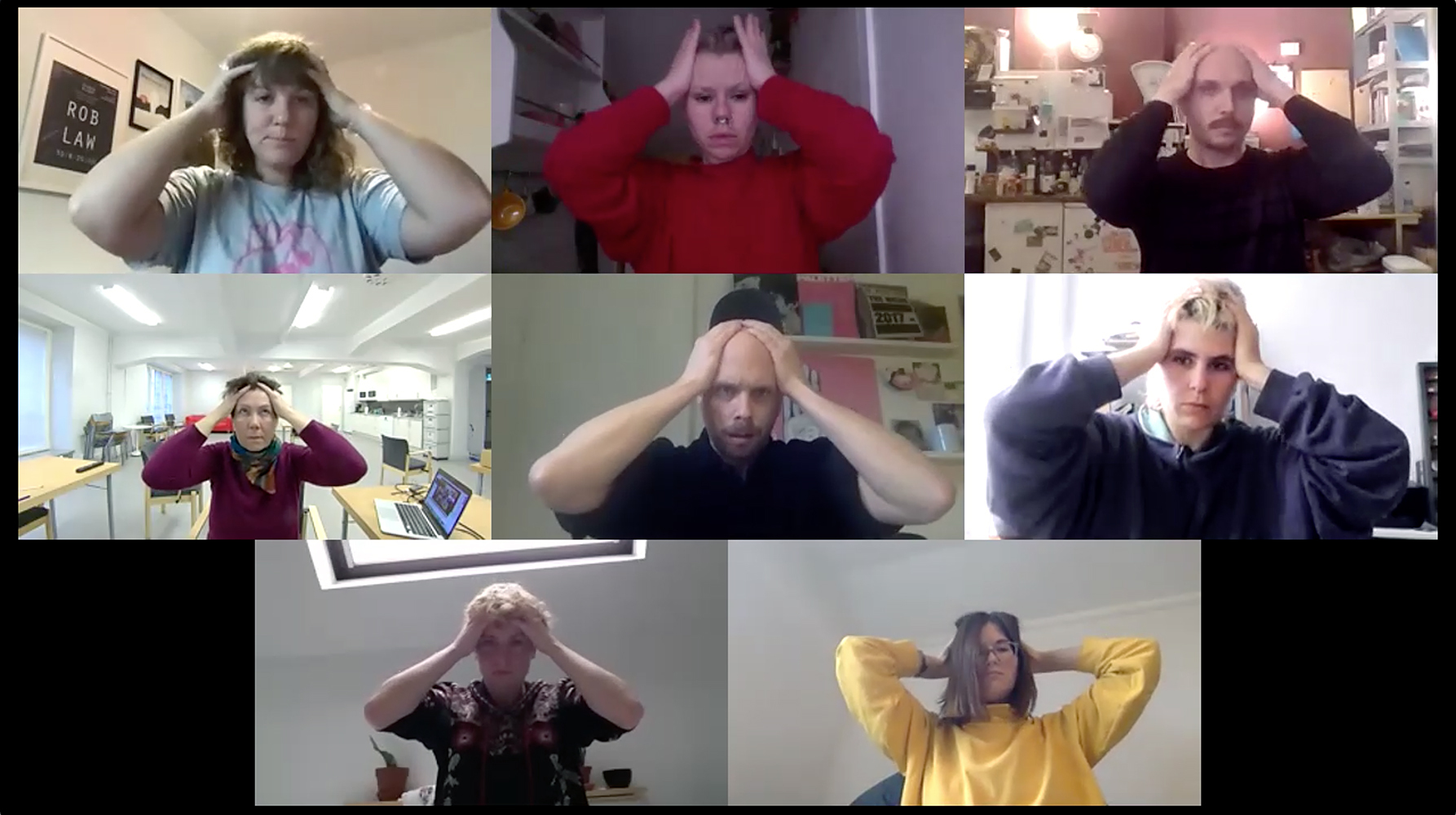
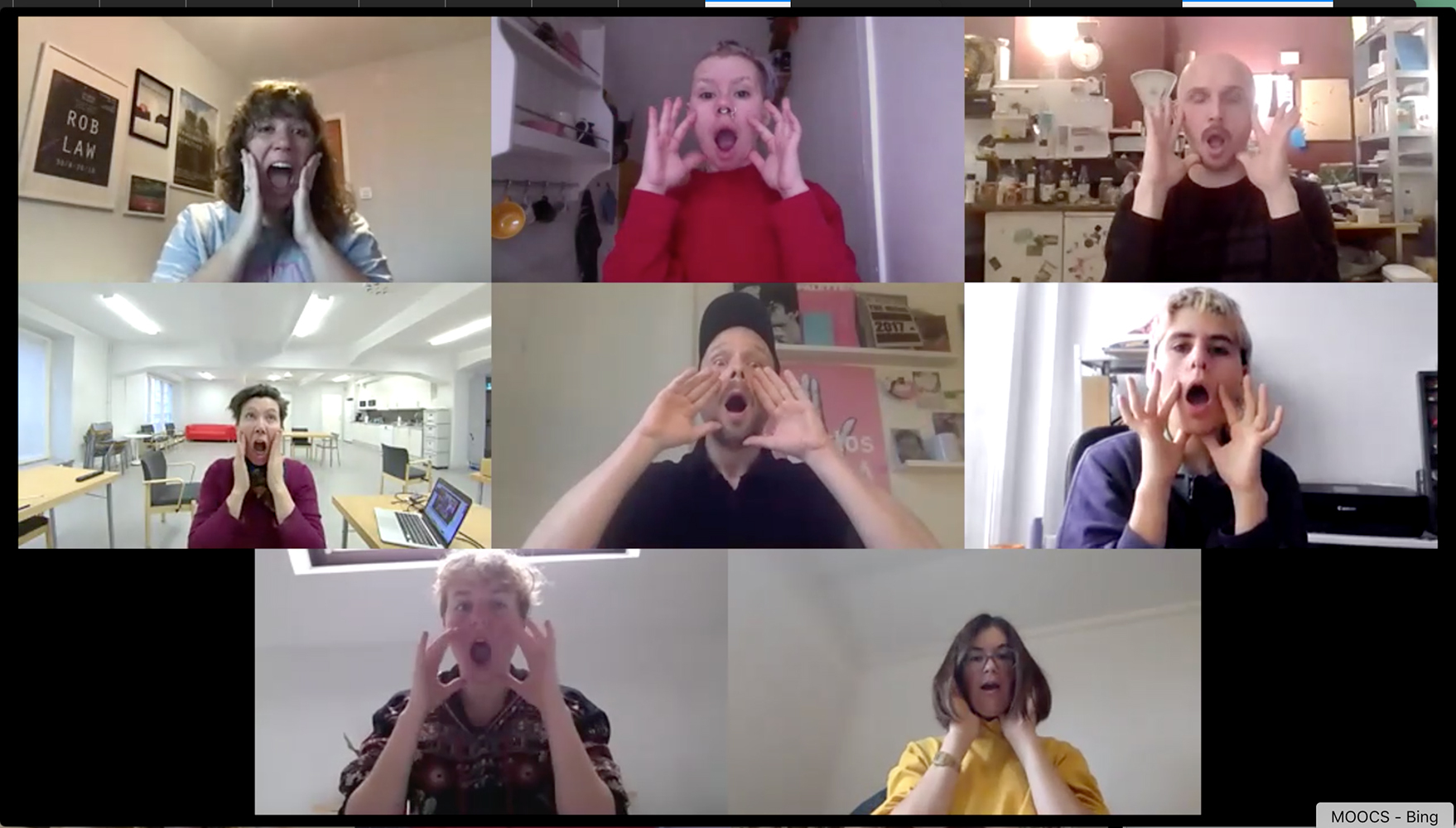
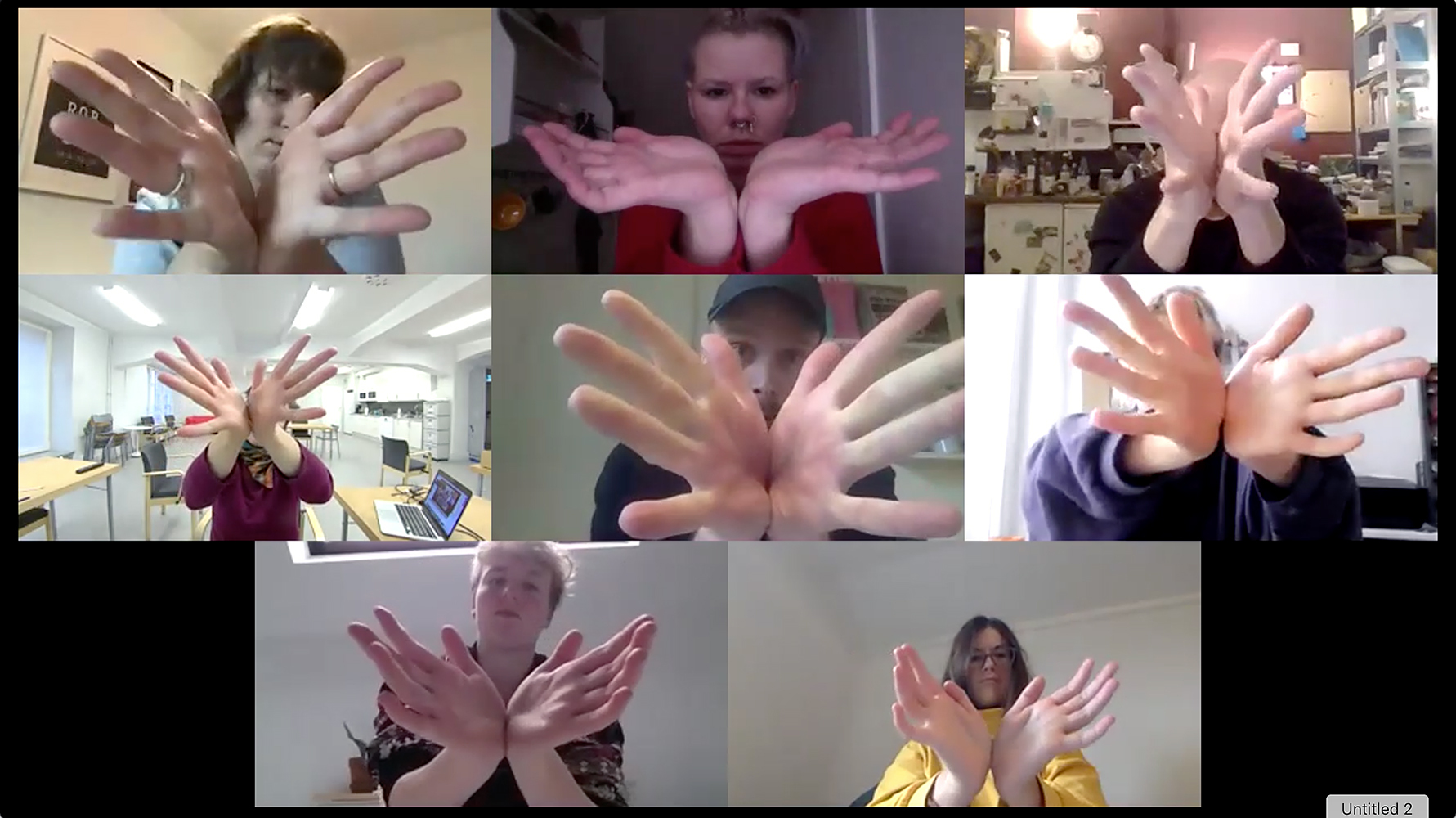
ice breaker: mirroring game, facilitated by Inga Kolbrun Söring
Meeting, Welcome and Kick-off
10:00, online
hosted by all
We started the week with a big group meeting to check in and catch up on everyone's situation across different countries, and to share the working groups’ progress achieved despite Covid.
Workshop, Preparation for Villa Arson
11:00, online
hosted by Isabelle Massu
A planning session on putting our pedagogies into practice at the upcoming event “Rencontres et ateliers: les pédagogies critiques en écoles d’art” (Meetings and Workshops: Critical Pedagogies in Art Schools) organized by the Villa Arson for 2-3 December 2021. This invitation allowed us to enter into alliance with the pedagogical team at Villa Arson, which was also working on critical pedagogies, notably those of bell hooks, Paulo Freire and Henri Giroux, whose aim was social transformation and the fight against inequalities (such as class, gender, and race). This November 2021 TTTToolbox week thus partly served as preparation for Villa Arson’s online workshops. In 2022, Villa Arson plans to publish an online platform containing content informed by these exchanges and experiments.
Meeting, Looking at the Budget
12:00, online
hosted by Eva Weinmayr and Laurence Rassel
This session offered all TTTT members an update on the programme’s budget situation, including changes to the budget due to lockdown. We discussed and decided how to use the funds that could not be spent on travel.
Workshop, Institutional Body: Mapping what we have Gathered
14:00, online
hosted by Samantha Hookway, Dani Heath and X Gorgol
The “Institutional Body” working group invited anyone interested to look at the materials they had produced in order to start mapping them out, editing and creating the contribution to the TTTToolbox platform.
November 17, 2020
Workshop, Who gets in? — Rethinking Admission, Roleplay: the Interview
9:00 — 11:00, @HDK-Valand
facilitated by Andreas Engman, Kolbrun Inga Söring, Eva Weinmayr
This session was an opportunity to workshop with each other (in real life) a range of roleplay settings in order to explore and work out the nuanced power relations at play in an admission interview situation.
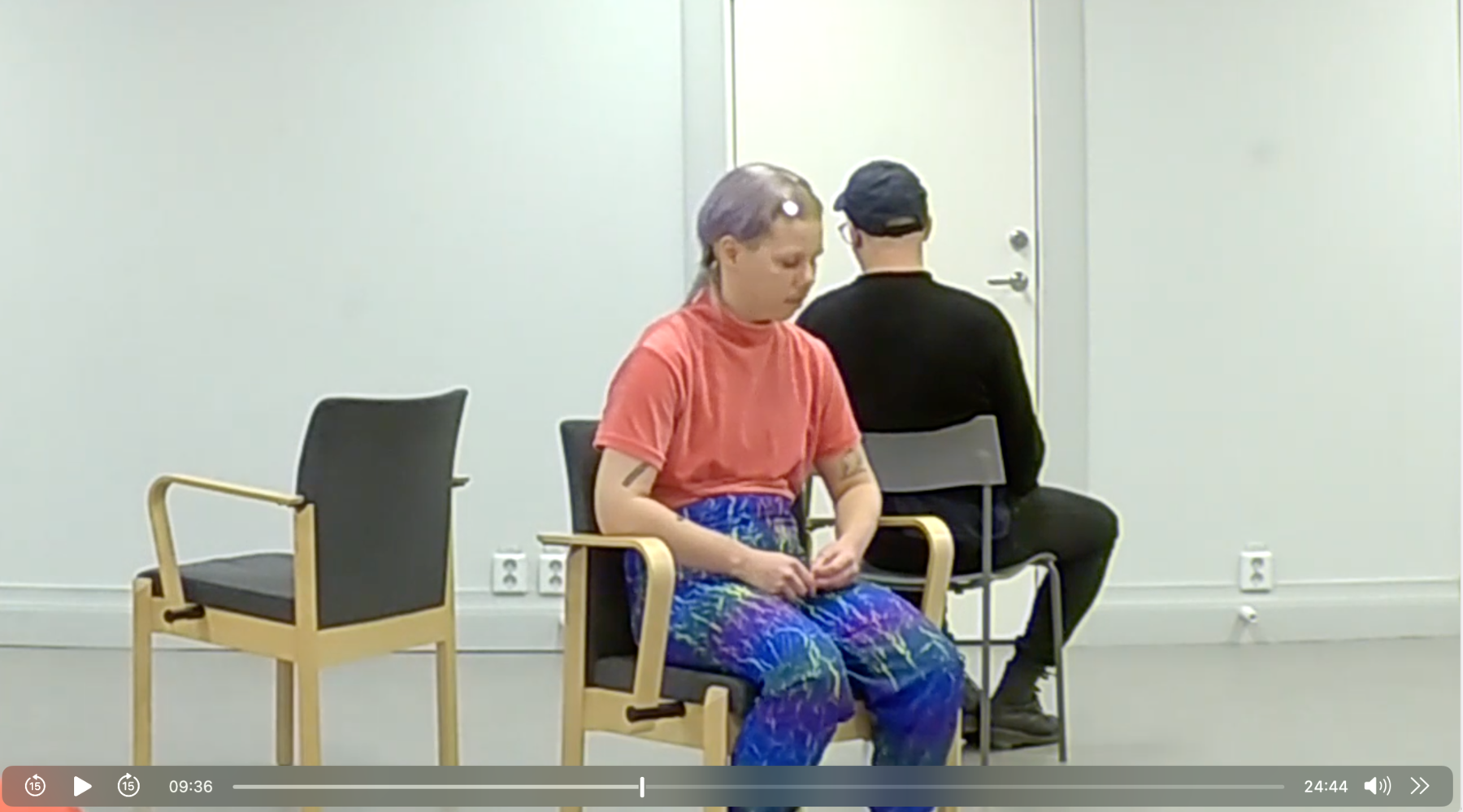
Rethinking Admission, Roleplay: the interview, Inga Kolbrun Söring, Andreas Engman, Eva Weinmayr
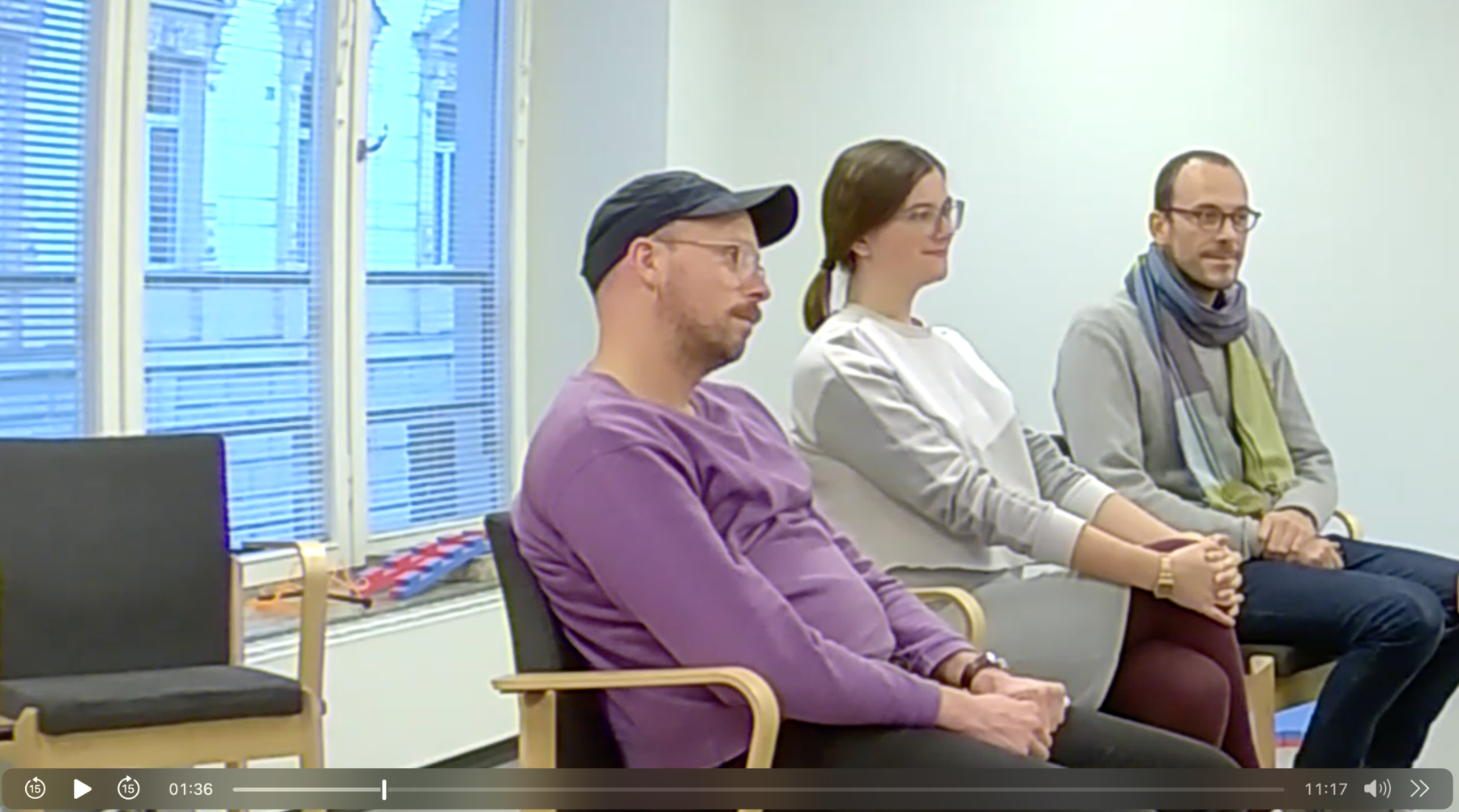
Roleplay admission interview: "You need a joke". André Alves, Andreas Engman, Inga Kolbrun Söring, Eva Weinmayr, Lucy Wilson
Vibes&Leaks meeting
group members meeting with X. Gorgol, Jara Rocha, Kym Ward
Mapping, Who is in the Classroom?
13:00 — 15:00, online
Hosted by Åke Sjöberg, Inga Kolbrun Söring, Eva Weinmayr
The working group “Who is in the Classroom” used this work session to revisit the series of interviews they had recorded, exploring the facilitation of pronoun go-rounds in classroom settings, including potential contradictions. It also decided a workflow for the next couple of months to develop a format for their research findings and a format for the TTTToolbox platform. See Who is in the Classroom?
November 18, 2020
Mapping, Institutional Body
9:00, online
Hosted by Samantha Hookway, Dani Heath and X. Gorgol
This work session built on the mapping exercise conducted on Monday and continued structuring, editing and connecting the strands of inquiry previously developed by the different group members.
Workshop, Language as a Virus > Bingo GGGO
10:00, online
hosted by Camille Circlude
with Nino André, Chloé Elvezi, Reuss Maureen Leprêtre, Martha Salimbeni
The group “Language as a virus” decided during this week to participate in the critical pedagogies online event at Villa Arson by proposing a collective writing workshop in French. This session was dedicated to the organization and the setting up of this workshop, "Bingo Gggo". The group decided to focus on the creation of two bingos as pedagogical tools: The “Decolonize Art Schools” bingo for the systemic racist phrases regularly used in art schools during evaluation, lessons, etc. (cf. Decolonize the Arts). This language, used principally by white people who have not deconstructed their curriculum, engenders systemic discrimination of POC, who are still minorities in art schools. The “I don’t like inclusive literature” bingo for systematic phrases against inclusive, non-binary, and gender-fucker language, as well as the non-binary typography commonly found in traditionally gendered languages like French.
Mapping, How to Speak with People you Disagree with
11:30 — 13:00, online and in-person @HDK-Valand
hosted by Gloria López Cleries, Lucy Wilson, Lani Fusako Duvall, Åke Sjöberg, Dani Heath, André Alves
The working group “Emotions in the Classroom” revisited the different areas of their work such as the “Glossary of Emotions” and the “Meeting Protocol” in order to start editing for the publishing platform.
Lunch@HDK-Valand, Gothenburg
13:00 — 15:00
@Old Hotel, Vasagatan 50, 41137 Göteborg
Mapping, Questioning the Notion of Neutrality
15:00, online & HDK-Valand
hosted by Zoya Feltesse, Gloria López Cleries, Ida Flik, Alexandra Eguiluz
In this session, which was mainly for the working group, but open to the curious, we re-watched parts of the interviews that the group had made and discussed how they could be edited and published. For the curious, it was advised that they watch the entire interviews before the meeting.
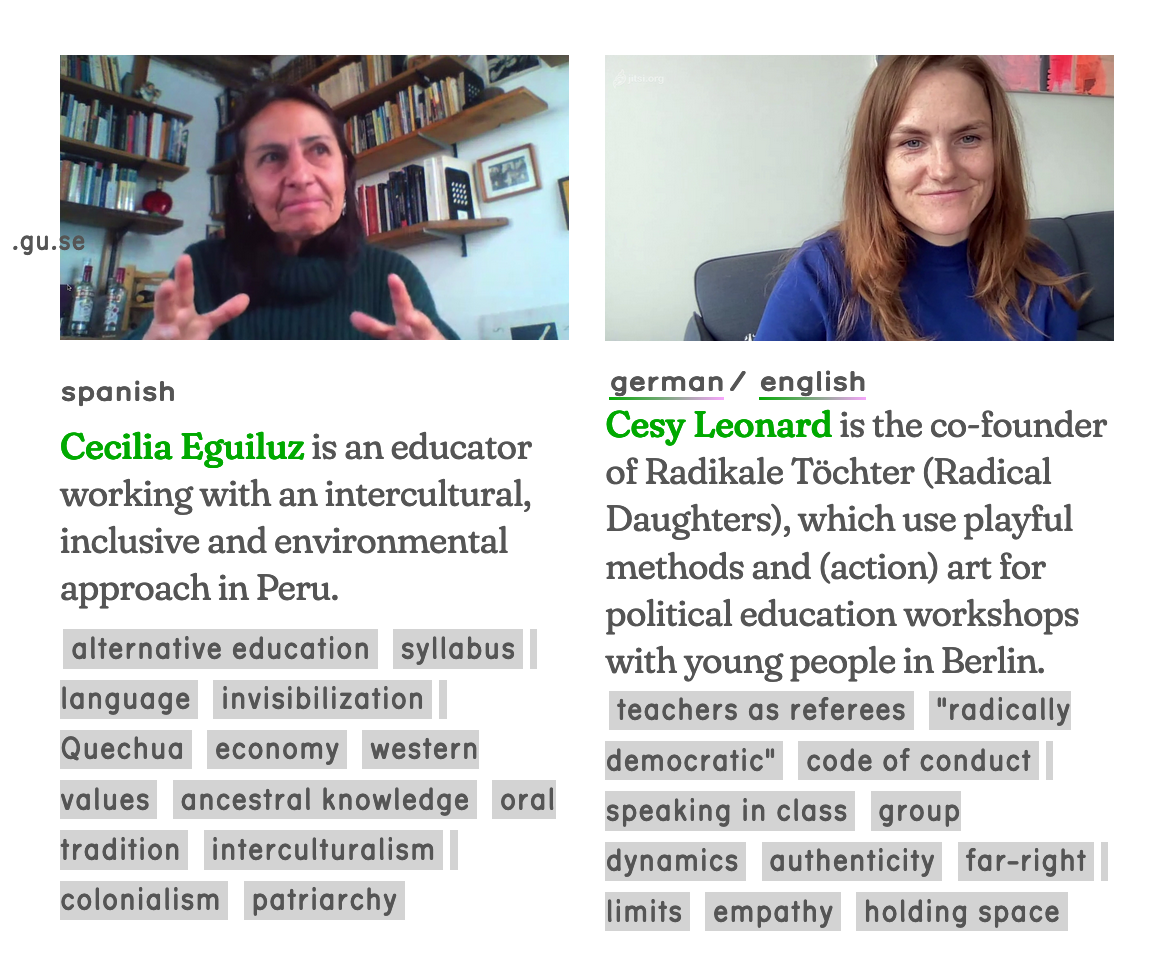
Watch "Questioning the Notion of Neutrality" interviews
November 20, 2020
Workshop, Opting in or out of TTTT
10:00, online
hosted by Sam Hookway, Emily B., Eva Weinmayr, Isa Massu, Lucy Wilson, Stéphanie Vilayphiou
Inevitably, in a programme like this, things can arise that cause people to leave. Covid-related issues were, in the end, a prominent example, though not the only one. That’s fine, but we had to ask how best to communicate about such departures. It is important when we work collectively to know that we can rely on each other’s commitment.
We hoped in this workshop to provide a moment for all members to honestly reflect on their involvement and, not wanting to make assumptions on this, we sought to develop a protocol for opting in or out. What we developed was a letter with a series of questions to be sent to each participant. This would assess their commitment and give them a medium for stating intent to stay or go.
Workshop, preparation for Villa Arson
hosted by Isabelle Massu
This moment was dedicated to general coordination of the different workshops taking place at the Villa Arson (finalizing the different proposals, planning the communication).
Workshop, Role-playing an admission interview at the art school
13.30 — 15.30, @HDK-Valand
hosted by Andreas Engman, Kolbrun Inga Söring, Eva Weinmayr
with André Alves and Lucy Wilson as guests
In this session, we invited guests to help workshop – in real life – a range of roleplay settings to explore and work out the nuanced power relations at play in an admission interview situation.

Roleplay admission interview: "You need a joke". André Alves, Andreas Engman, Inga Kolbrun Söring, Eva Weinmayr, Lucy Wilson Watch clip
Meeting: Check-out and outlook to the future of the project
16:00 — 17:30, online
hosted by all
In this last meeting at the end of the three-day workshop week, we discussed how we could possibly continue with the programme despite the ongoing pandemic and its travel restrictions. How could we keep collaborating meaningfully online or create local and contextual collaborations?
Sparring Partners Work SessionJune 6 — 10, 2020
@HDK-Valand
A three-day online workspace organized by HDK-Valand, Göteborg University. We investigated the complexities of an institutional body, meeting to work through this body through its members, its language, its movements, its protocols, its entry points, its questions.
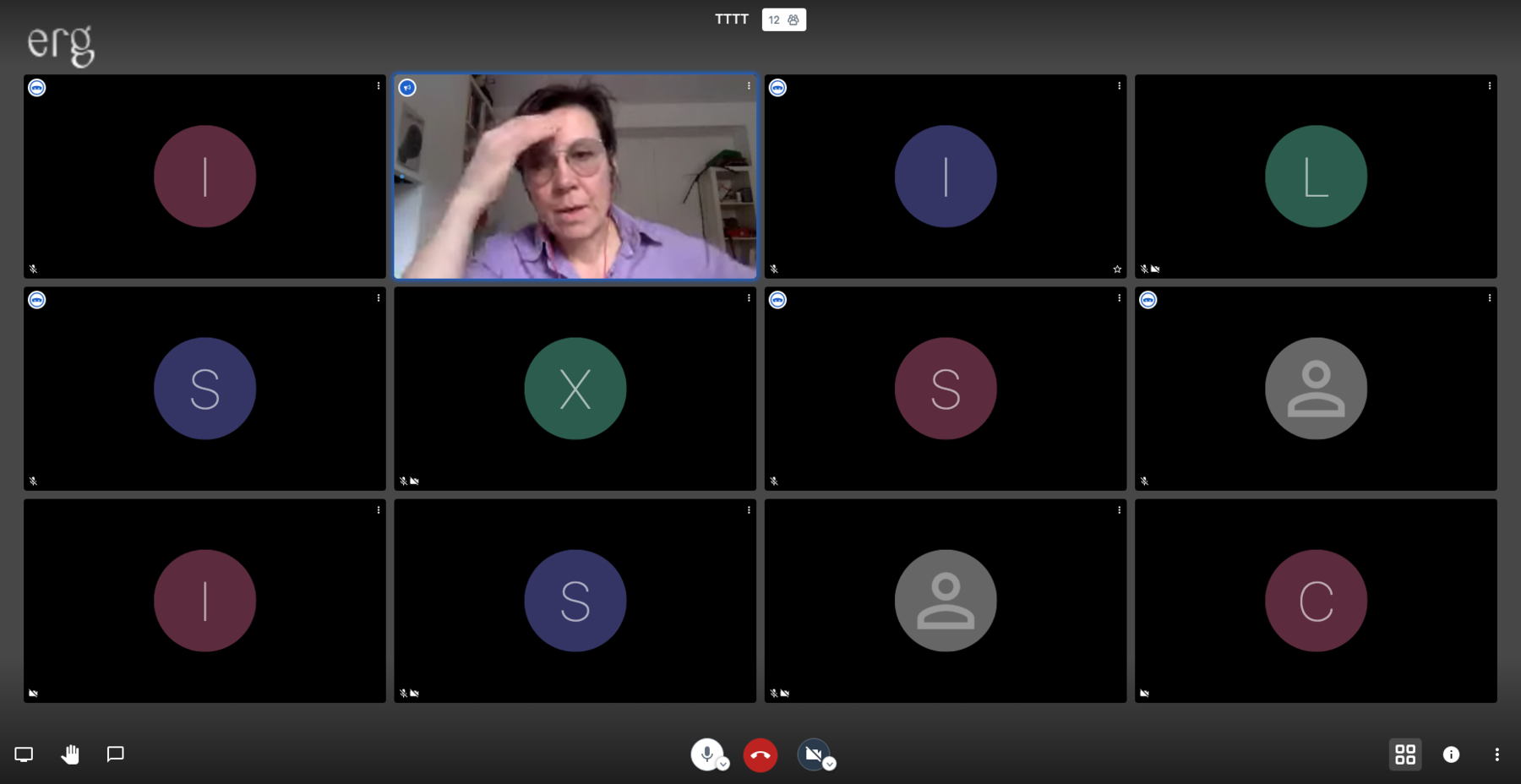
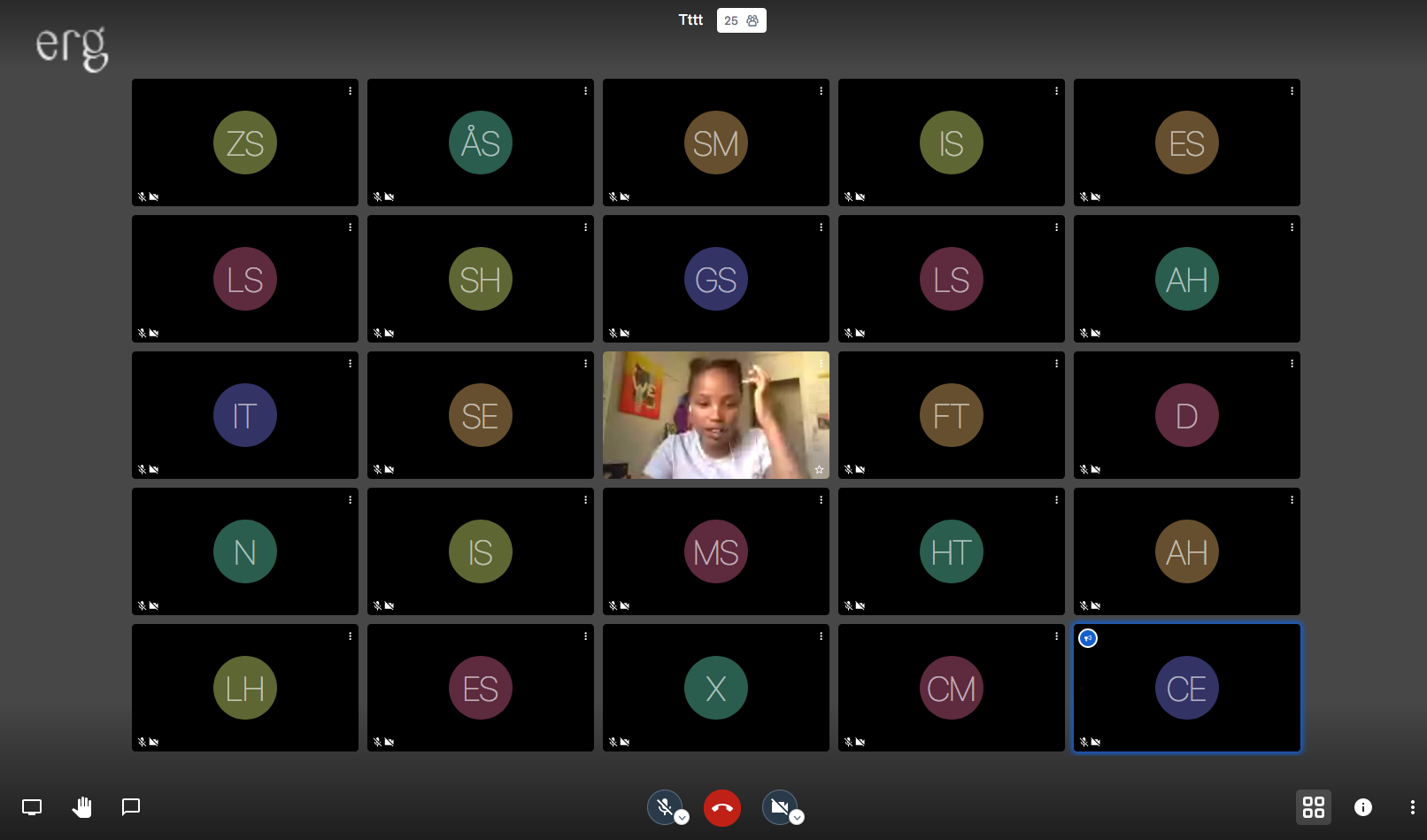
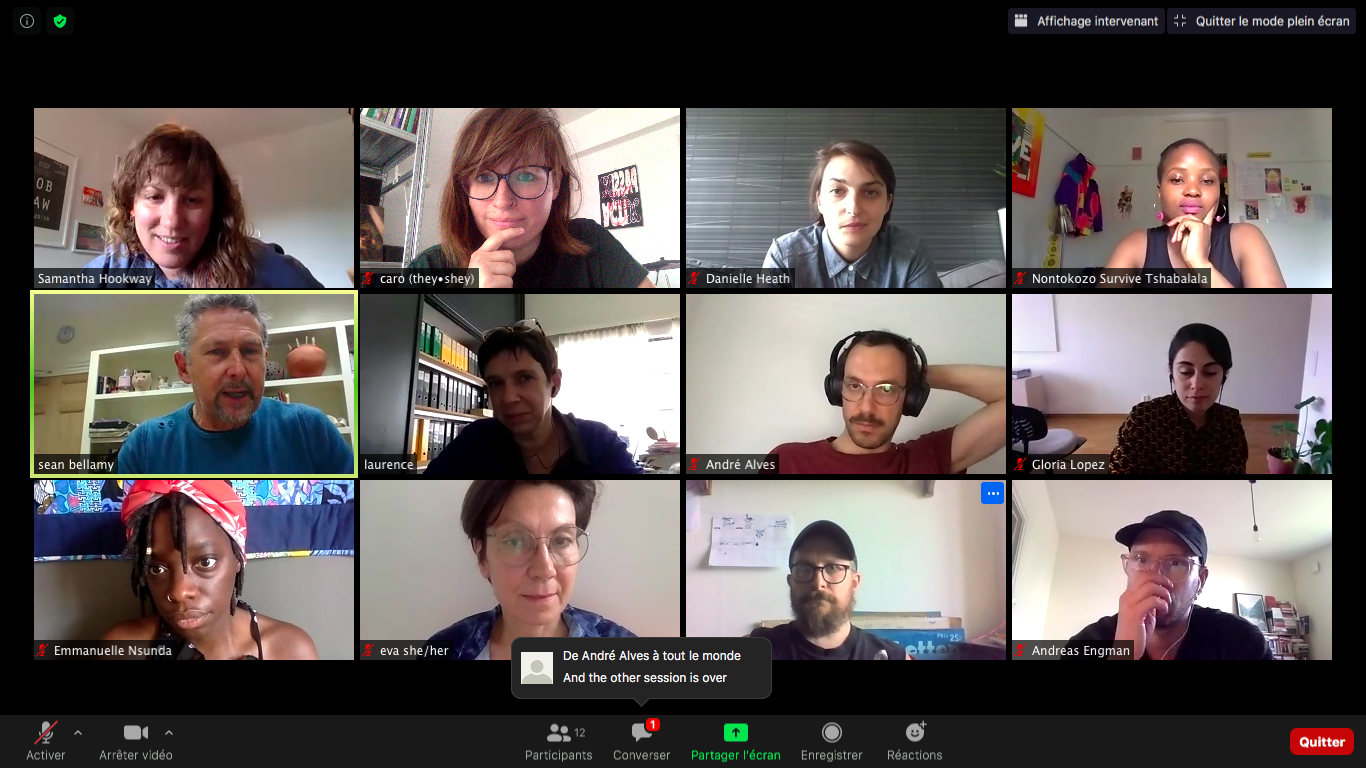
Monday, June 8, 2020
Workshop, Who gets in? — The Interview
11:00, online
hosted by working group “Admission Policies – Confronting Segregation” (Andreas Engman, Inga Kolbrun Söring, Eva Weinmayr, Lucy Wilson)
In this workshop, the group mapped the key steps and procedures in the admission process at HDK-Valand. (What info is available for prospective applicants? How is the admission process set up? What funding for international students is available? What happens after someone is admitted?) We also shared experiences and facts about the admission process at participants’ art schools. What are the hurdles that put them off? What are the implicit dynamics of conducting interviews – think for example of the TTTT admission interviews? See also Rethinking Admission – confronting segregation.
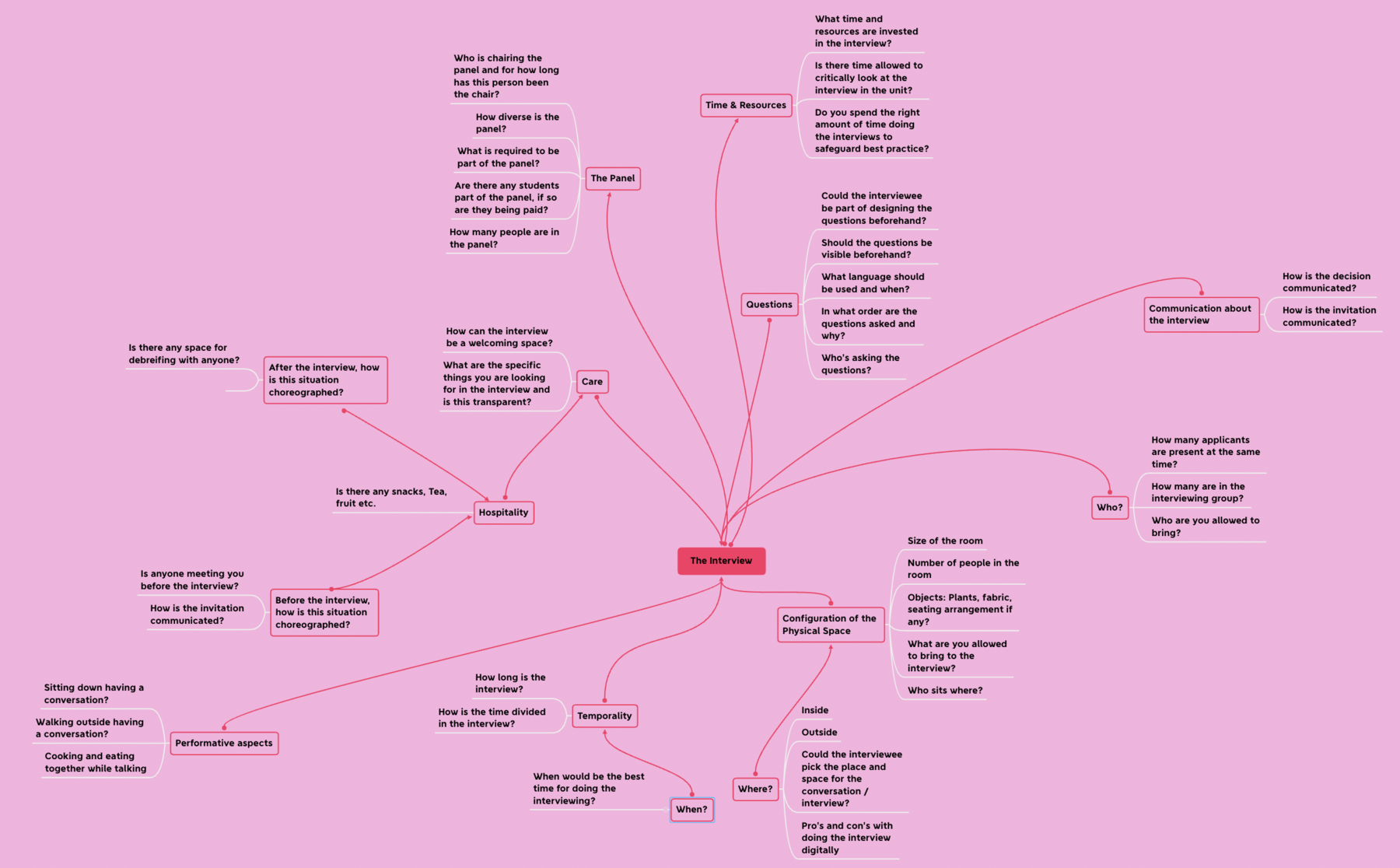
Mapping the facets of admission interviews in higher education in the arts – work in progress
Workshop, Developing Publishing Mechanisms
13:00, online
hosted by Chloé Elvezi, Reuss Maureen Leprêtre, Ida Flik, Sarah Magnan and Stéphanie Vilayphiou
We discussed possible protocols and workflows for developing the publishing platform. What did we envision the TTTT platform being like upon completion? What did we want to achieve with the platform? Who would it be for? How would we develop protocols for approving what would be published?
Workshop, Concepts of Neutrality – Idea Sharing
14:00, online
hosted by working group “Questioning the Notion of Neutrality” (Gloria López Cleries, Alexandra Eguiluz, Ida Flik, Zoya Feltesse)
In this session we invited all TTTT people for feedback on and suggestions for our plans and welcomed anyone interested in contributing. The group's aim was to conduct interviews with a range of people on the idea of neutrality in the university/academy, including perspectives from a range of communities. Our focus was on gender, race, disability, class, and their intersections. More specifically, we wanted to discuss the history of university institutions and the racist, patriarchal, ableist foundations they were built on, and how these foundations continue to shape universities today (e.g., the hegemony of certain knowledges, structural exclusion, etc). We discussed the concept of a “neutral” teacher and how this could be re-thought with an awareness of different positionalities, lived experiences and inherent bias. See also Questioning the Notion of Neutrality
Reading session, White Supremacy Culture
16:00, online
hosted by Helio Hoarau
In this session, we collectively read Tema Okun's text, "White Supremacy Culture". The text examines a range of white supremacy culture’s characteristics and how they affect organization in the Global North. It also provides some antidotes and tips. We also discussed and shared our experiences.
From the text’s introduction: “Culture is powerful precisely because it is so present and at the same time so very difficult to name or identify. The characteristics listed below are damaging because they are used as norms and standards without being proactively named or chosen by the group. They are damaging because they promote white supremacy thinking. Because we all live in a white supremacy culture, these characteristics show up in the attitudes and behaviours of all of us – people of colour and white people. Therefore, these attitudes and behaviours can show up in any group or organization, whether it is white-led or predominantly white or people of colour-led or predominantly people of colour.”
Screening, Democratic Schools documentary
19:00, online
hosted by Danielle Heath and Ida Flik
In this session, we explored alternative schooling systems and invited participants to collectively watch a video giving insights into the daily life of a Democratic School. We discussed what we could (and couldn’t) learn from such a school concept and/or how that learning might be applied to university and art school settings. Invited guests (teacher and student) joined the discussion.
Wednesday, June 10, 2020
Workshop, Conflict, and Conflict Patterns
10:00 — 13:00, online
facilitated by Lena Besenhard, Julian Knop (Stuhlkreisrevolte, Berlin)
What is a conflict and how does it work – especially when the dispute is personal, but also in hierarchical situations such as universities? And what is a conflict in the field of art? How does a conflict build? What are your personal ways of dealing with conflicts – what are possible ways people can cope with conflict?
Lena and Julian from the Berlin-based emancipatory education collective Stuhlkreisrevolte facilitated a workshop for the TTTToolbox participants to reflect on these topics as a group. The workshop necessitated three observer roles: people who chose not to actively participate in the exercises and discussions, but to watch for communication patterns and group dynamics instead. It was thought that this taking a step back and examining the topic and the group’s behaviour from a meta-level might be constructive. Within a framework defined by prepared questions, the observers took notes on their insights from these observations and tried to draw some conclusions to be shared with the group in the last third of the workshop.
Reading session, Radical emotional honesty as a feminist pedagogical tool
14:00 — 15:30, online
hosted by Åke Sjöberg
In this reading session, we read out loud and discussed chapter three of bell hook's book All About Love. The following questions were central to our discussion:
Can we apply bell hooks' thinking on the importance of honesty between people in primary (love) relationships to the love relationships that hold one’s community together? If we used radical emotional honesty, would it be possible to transform the social spaces we are already part of (such as the classroom) into sites of community? See also Emotions in the Classroom.
Workshop: What do we need to know from each other?
15:30, online
Hosted by Åke Sjöberg, Inga Kolbrun Söring, Eva Weinmayr
In this short session we invited participants to join a working group of ours that collects, maps and shares possible methods for inclusive introduction/pronoun/access rounds. These methods can be applied not only in the classroom, but for group work in various situations. What do we need to know from each other? How can we respect each other? How can we help each other? See also: Who is in the Classroom?.
Workshop: Vibes & Leaks
16:00, online
hosted by Xavier Gogol, Jara Rocha and Kym Ward
In this workshop we looked at the development of the voice apparatus through affect. Informed by the theories of Silvan Tomkins on the ways in which toddlers learn emotions, we looked at the neural phenomena and stimuli that set up language, and at echoes and the impact of voices from the past. Also, at work in this session was the practice of listening, which is the creative counterpart to affect and voice. This practice is examined on a recurrent basis in the practices developed by the Vibes & Leaks projects.
Workshop, Language as a virus
17:00 — 19:00, online
hosted by Camille Circlude
In this informal online meeting we collected topics of interest related to dismantling normative assumptions on the neutrality and universality of language and typography, innovating inclusive writing methods through graphic and typographic forms. We will build on the first worksession in January and continue jointly writing informal mash-ups (mixing vernacular texts, institutional texts and activist texts) that question institutions.
Friday, June 12, 2020
Workshop, Open-source tools for the publishing platform
9:00, online
hosted by Sarah Magnan and Stéphanie Vilayphiou
To prepare us for continued digital work over the following months, this was a step-by-step introduction to using the TTTToolbox platform and the cloud. In this session, participants could ask any tech-related questions that came up during the week. We also introduced the calendar feature on the cloud to make sure we know of each other's meetings and upcoming events.
Workshop: Introduction to Organon
10:00, online
hosted by Isabelle Massu and Jeanne Revel
How can we transmit the methods and tools that we are creating? To answer this question, we presented Organon, an open source tool for writing and re/performing scores, e.g., notation for musical works, performances, actions, activities or processes. This notation tool could potentially help to share and adapt methods for a variety of pedagogical situations.
Workshop: Emotional Glossary
11:00, online
hosted by Gloria Lopez Cleries, Lucy Wilson, Lani Fusako Duvall, Åke Sjöberg, Dani Heath, André Alves
We invited participants to join us in writing an “emotional glossary” to understand, articulate and discuss emotions in the collective experience (of this project). The aim was to question common assumptions about emotions and the role they play in group situations. See also Emotions in the Classroom.
Workshop: The Institutional Body
13:00, online
hosted by Samantha Hookway, Emmanuelle Nsunda, Sylvain Souklaye, Dani Heath, X. Gorgol
In this workshop we captured HDK-Valand, erg and ISBA students’ voices/opinions/dreams. What is the dream school? What ideas are there about how it could function?
The current working group “Institutional Body” lacked a sufficient variety of student voices within the group. This session’s focus on the student perspective was to ensure more students would inform this research. See also Portal to the Institution.
Wrapping-up the week
16:00, online
hosted by Kolbrun Inga Söring and Eva Weinmayr
From the announcement: “In this session we will make space for collective reflections and feedback on the week. We will look ahead and make plans about next steps. We will also instruct everybody on how to fill out the attendance certificates. Lol.” For comprehensive reflection on the entire programme, see “Inclusive Reflection Methods”.
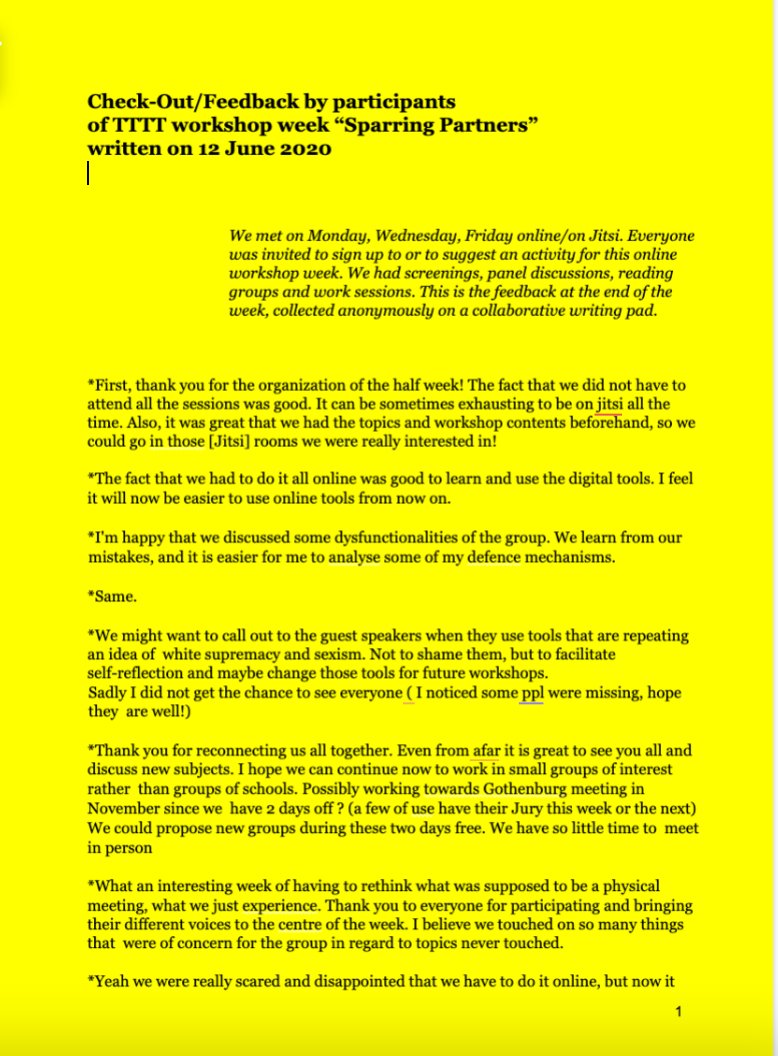
Written feedback/check-out of the workshop week “Sparring Partners” hosted by HDK-Valand, June 8–12, 2020. Download PDF.
Forming Ties Public Get-together
Thursday, March 12, 2020
17:00 > open end
hosted by Ida Flik
@HDK-Valand, Glashuset, Göteborg. (SE)
In the preceding months many new initiatives, groups and ideas had been created at Göteborg University and beyond. We therefore invited participants to a get-together, to share ideas, experiences, contacts and resources, strengthening networks of feminist, anti-racist, anti-fascist, emancipatory solidarity within the university and beyond.
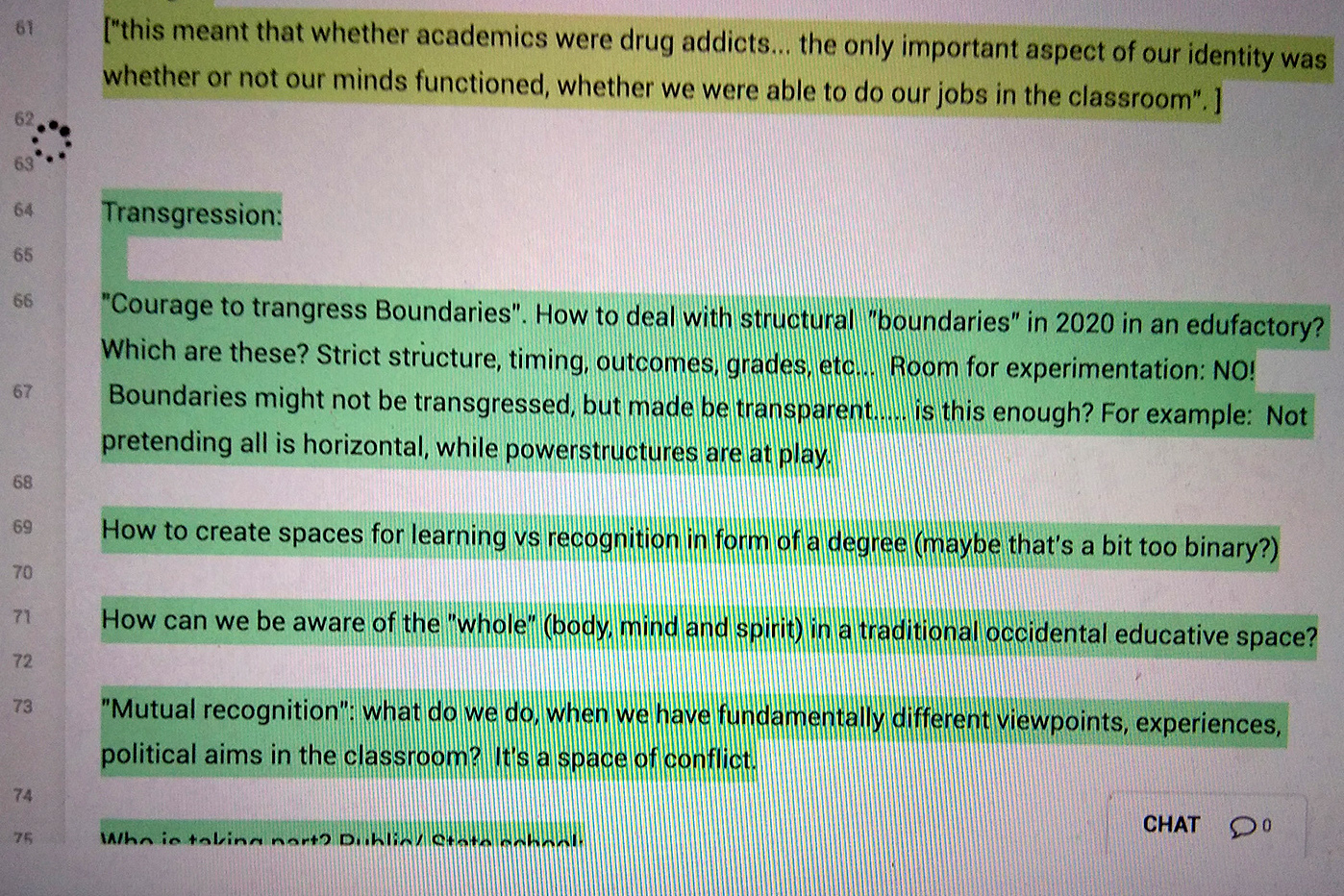
Work Session: How to Say it? January 27 — 31, 2020
@erg, Brussels
The first week of workshops in Brussels was punctuated by guest interventions, moments of collective work and daily feedback sessions. In order to create a link between guests and participants, the former were invited to take part in the whole week, thus becoming participants themselves. This protocol made it possible to adjust the power hierarchies without denying them.
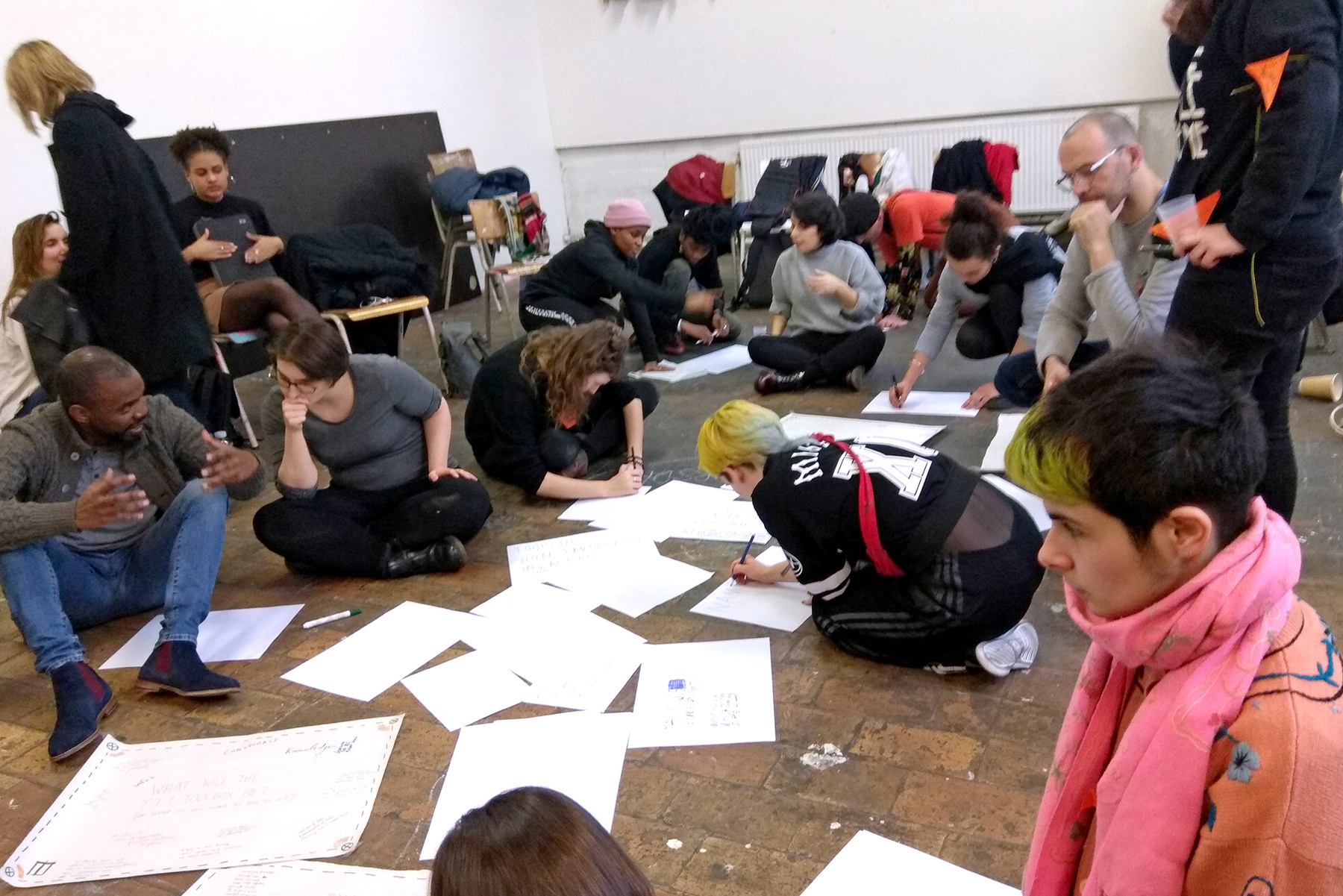
Monday, January 27, 2020
Mapping topics and urgencies
@erg, Brussels
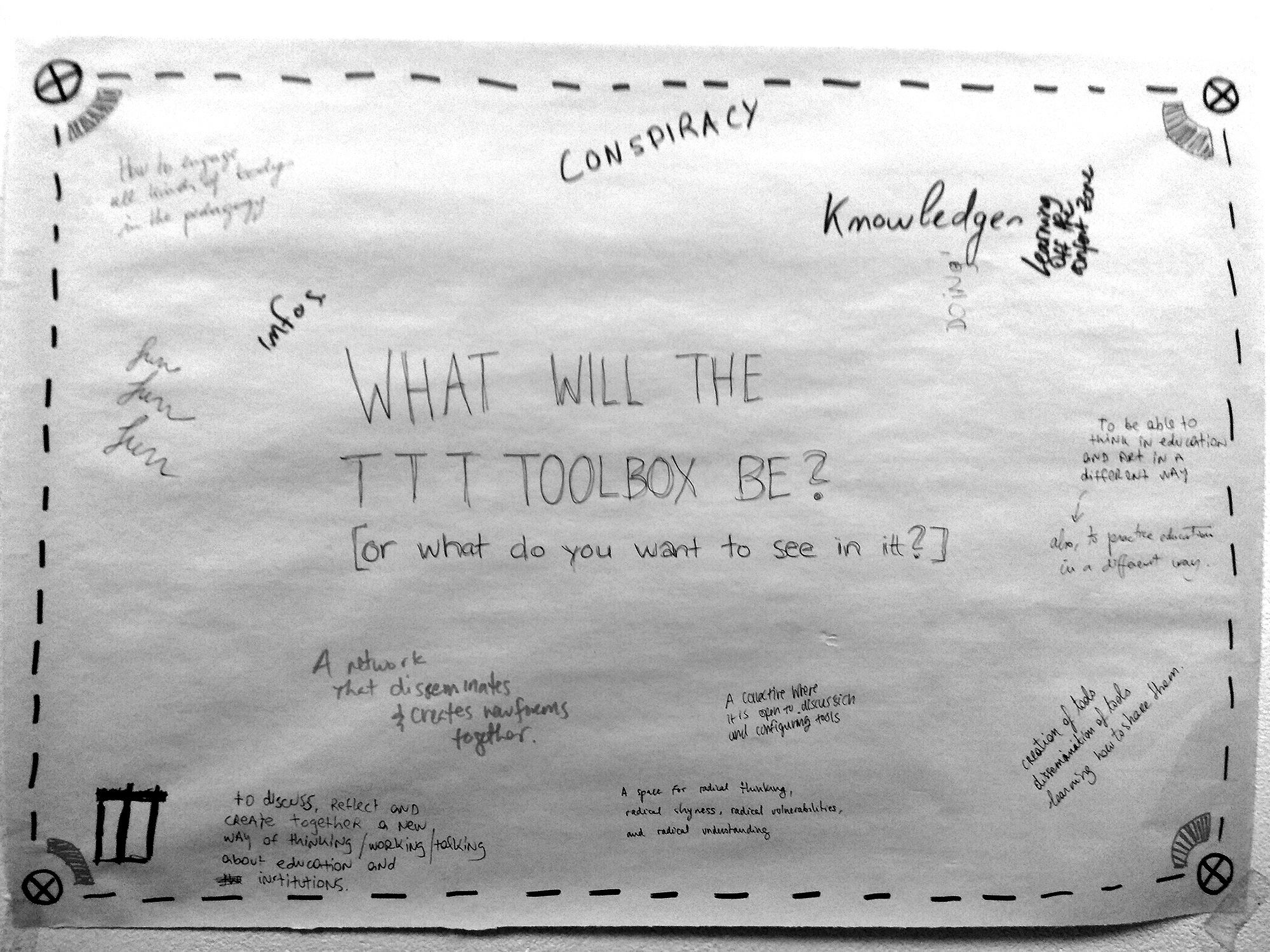
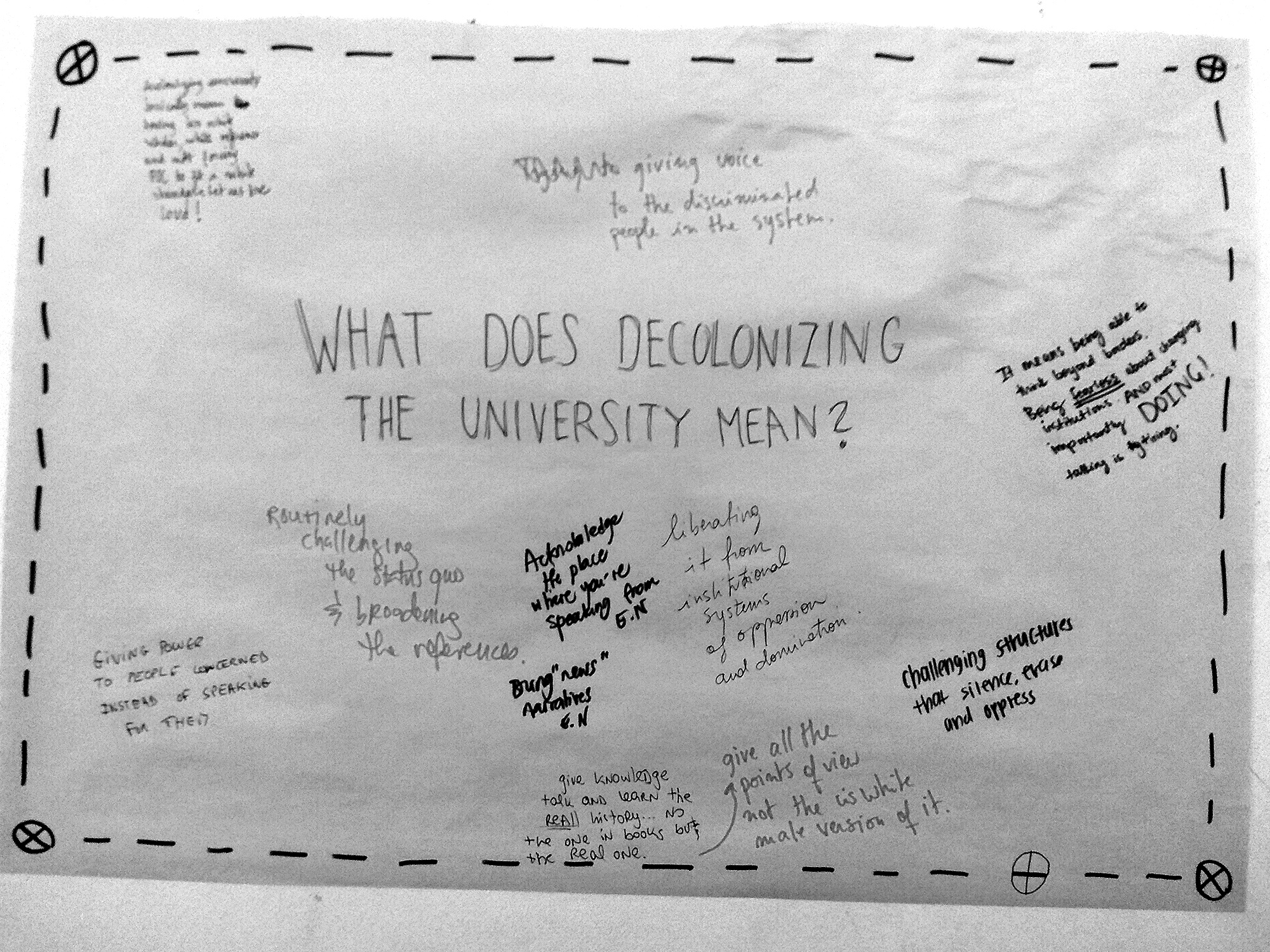
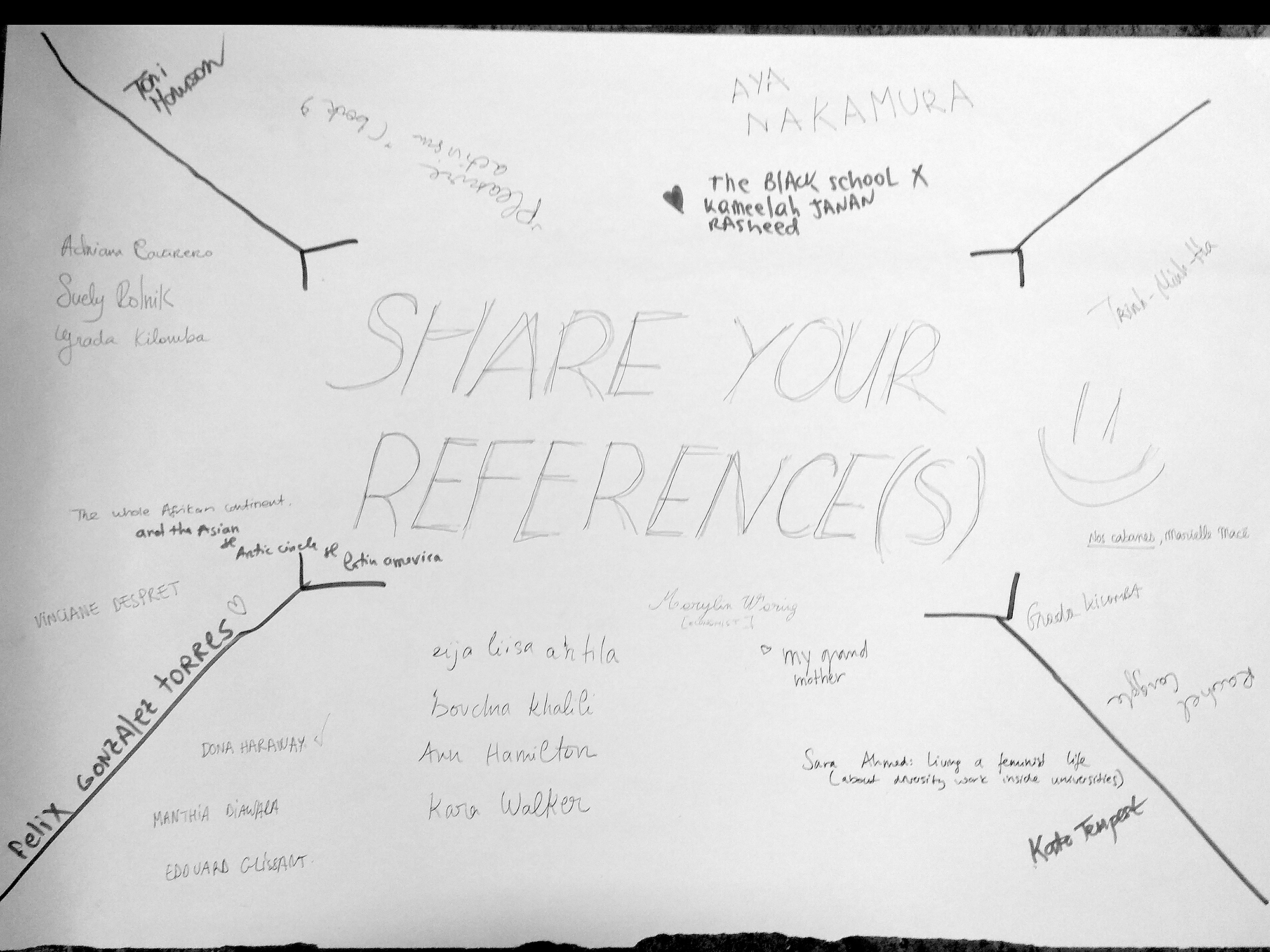
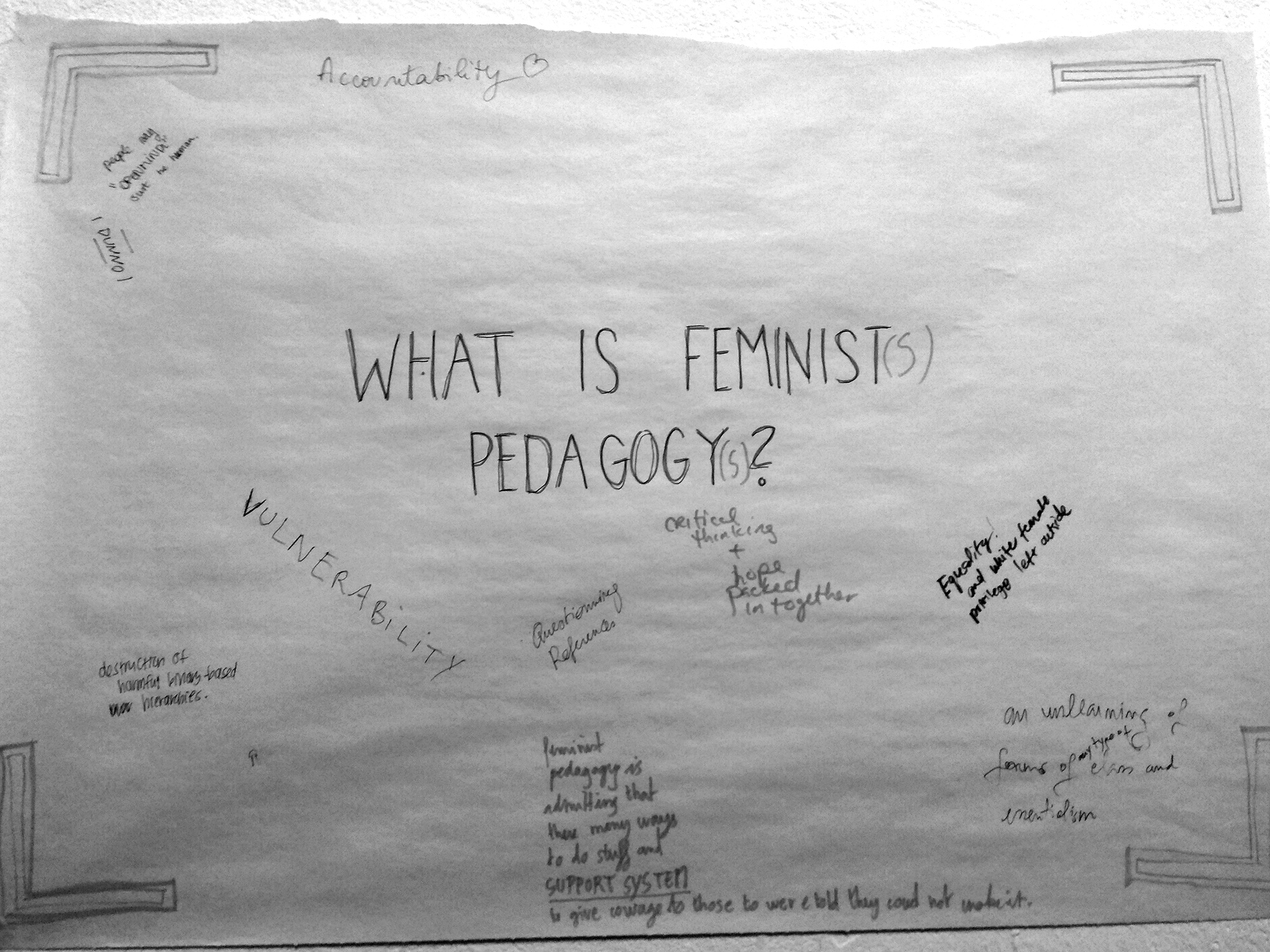
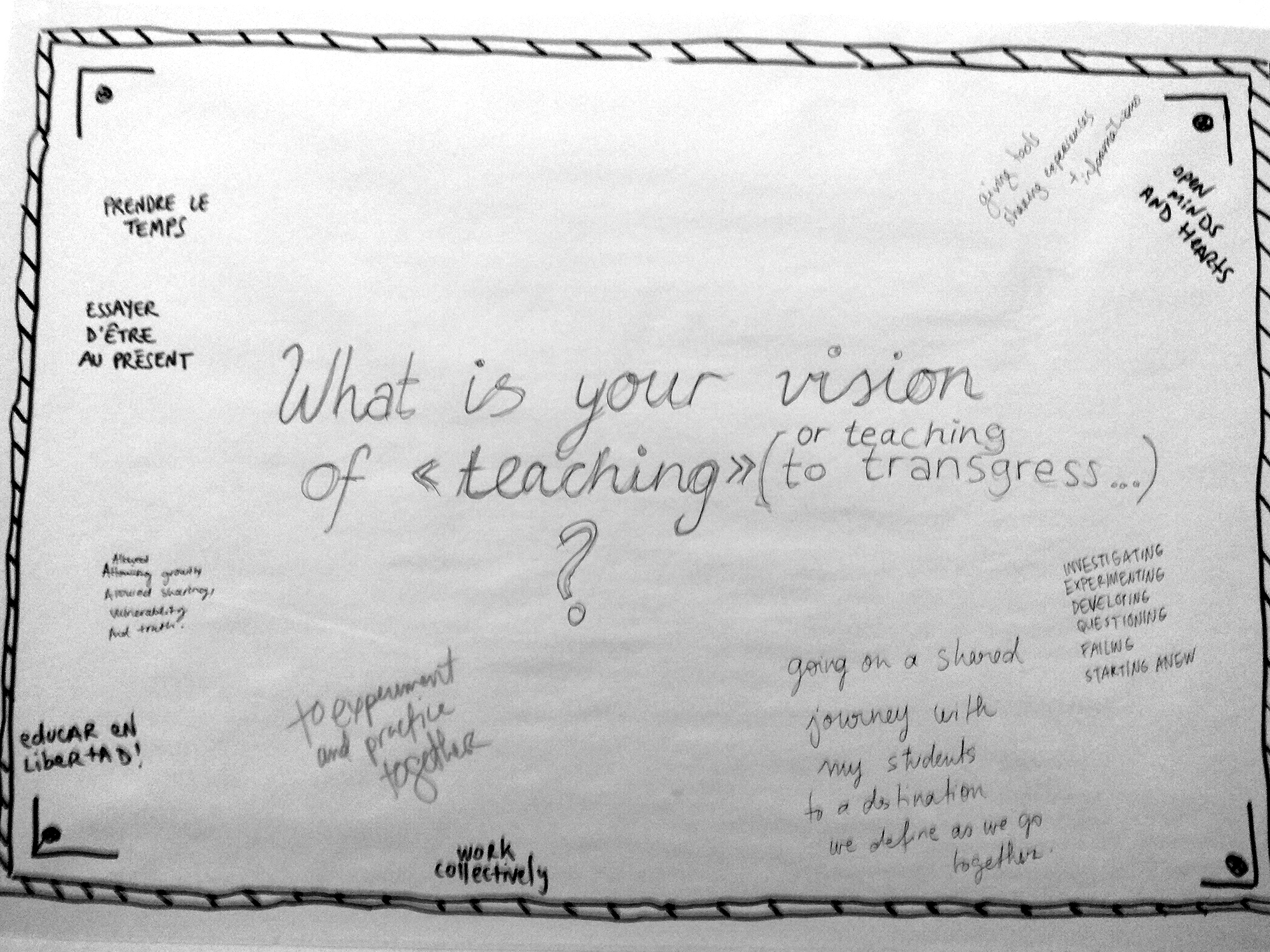
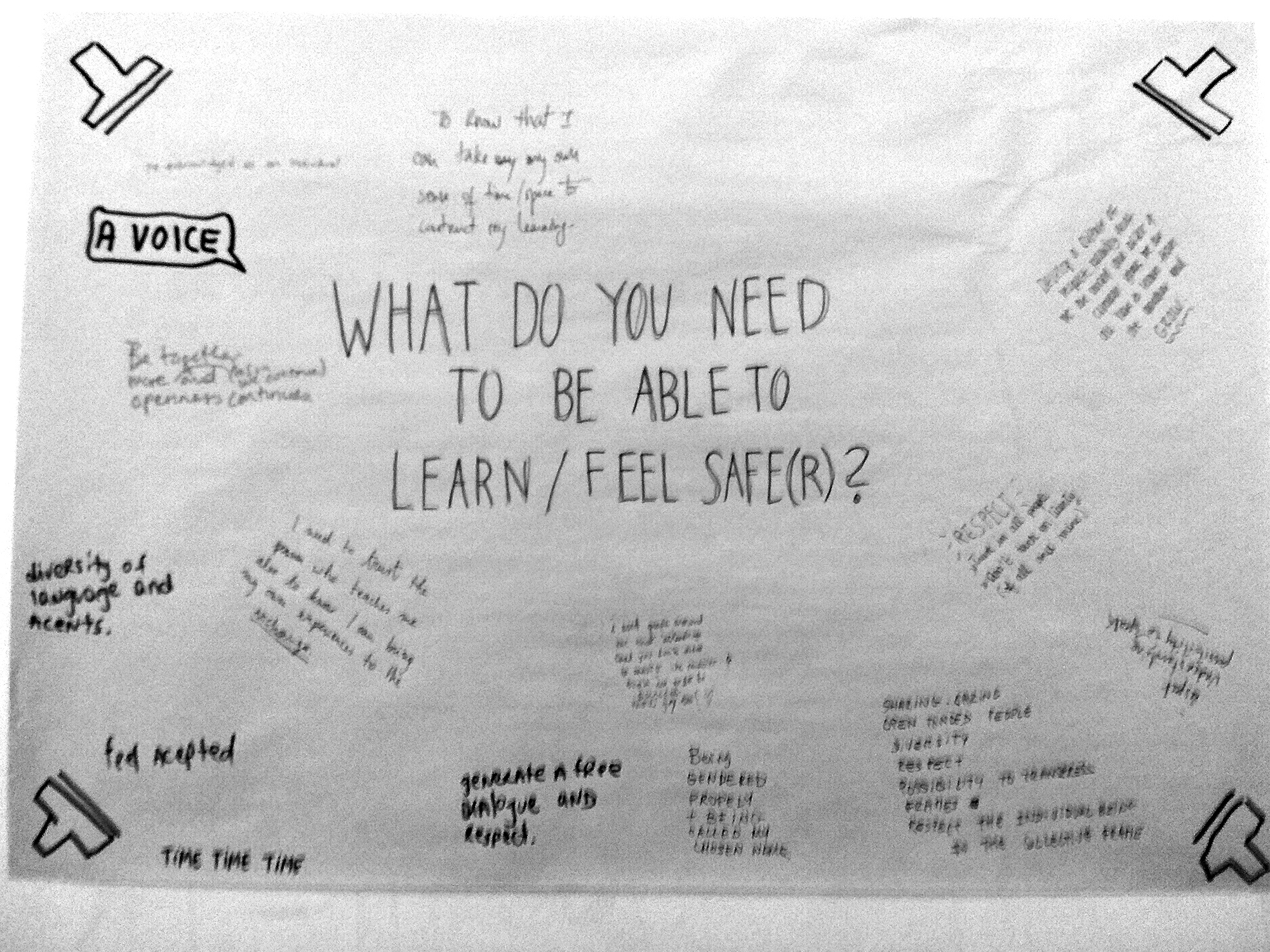
Introducing Positionalities — facilitated by Eva Weinmayr
MC Coble, Nika Dahlberg-Melin, Eva Weinmayr. Clip: “Learning to unlearn”
A workshop that presented and facilitated a go-round as a way of introducing pronouns and access needs for the TTTT team (participants, affiliates, organizers) attending this first worksession in Brussels. The exercise’s goal was to minimize the assumptions we make about each other and create a safer space. See also Who is in the Classroom?
Education as the Practice of Freedom – a collective interview with Nassira Hedjerassi
Nassira Hedjerassi, sociologist and professor of Education Sciences at Sorbonne University, is also a member of the Institut bell hooks — Paulo Freire in France and wrote the preface to the French edition of bell hooks’ Feminist Theory: From Margin to Center. She shared her knowledge on feminist and critical pedagogies (she and presented a fictitious playful dialogue between bell hooks and herself. This was followed with questions collectively prepared by the participants, derived from reading chapter two, “Engaged Pedagogy,” of bell hooks’ book Teaching To Transgress. This book’s title had, of course, been the inspiration for the TTTToolbox programme’s name.
Tuesday, January 28, 2020
How many? — Joëlle Sambi Nzeba
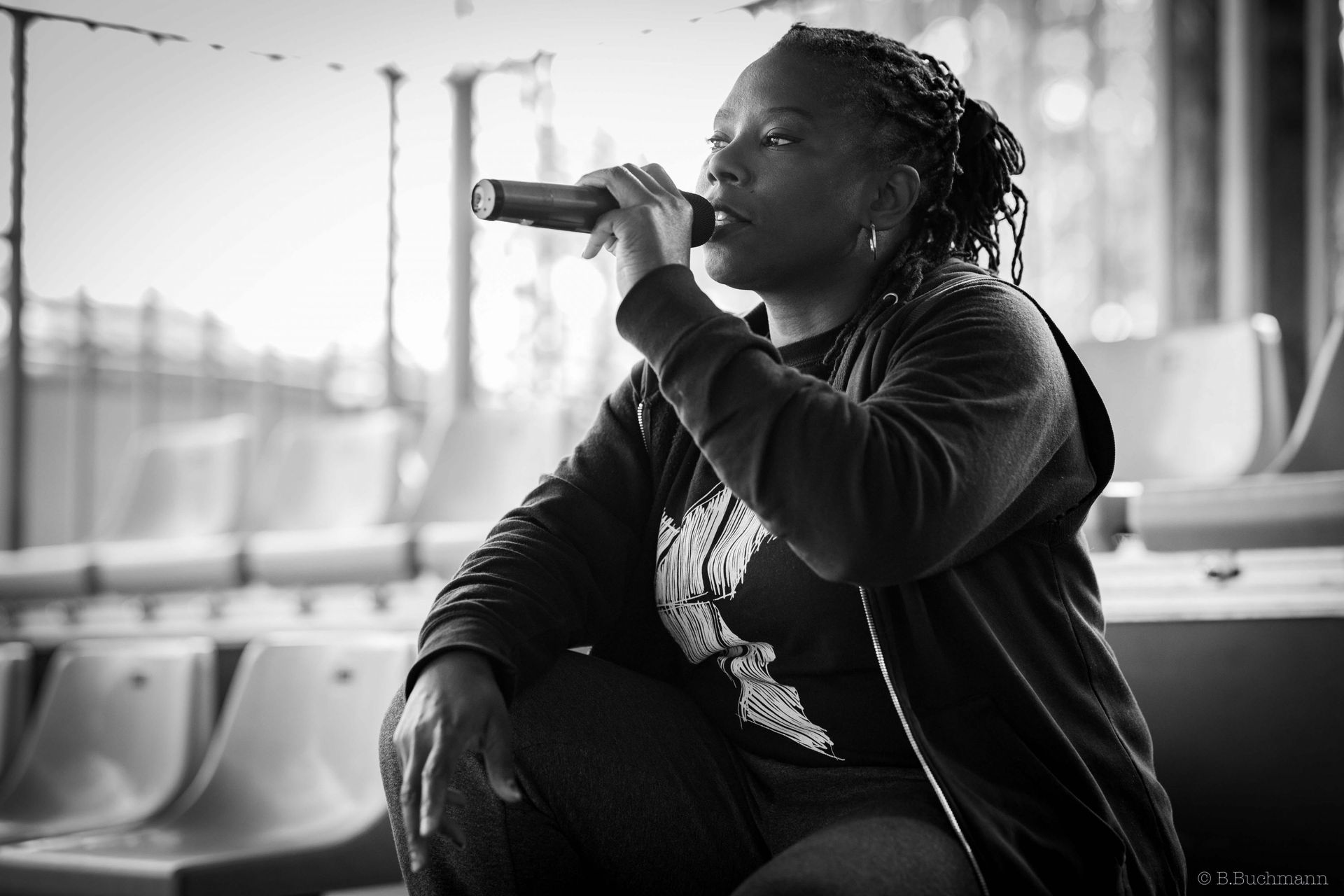 Joëlle Sambi Nzeba
Joëlle Sambi Nzeba
Joëlle Sambi Nzeba, author, poet, slammer and director, shared her slam practice to kick off a collective writing workshop/slam session in small groups. Participants were invited to share their texts, take the floor and affirm themselves. Joëlle also shared the making of her film P!nkshasa Diaspora, which gives a voice to LGBT people of the Congolese diaspora for the first time.
See the outputs of this event:
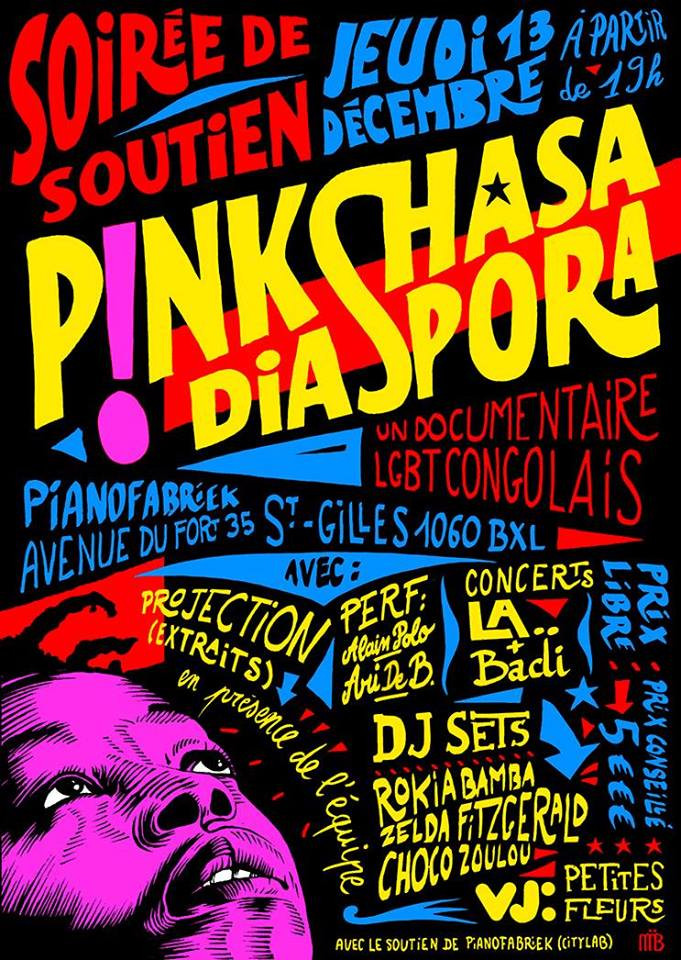
P!nkshasa Diaspora – poster
Wednesday, January 29, 2020
Language as a virus – by Tif*Felixe Kazi-Tani
Tiphaine*Félixe Kazi-Tani is a designer-researcher and theorist who studies struggles against contemporary political hegemonies (homosexual struggles, transfeminist struggles, anti-capitalist struggles, etc.). Tif*Felixe shared their text “L'Expert & le Cannibale: quelques notes sur la domestication” (The Expert & the Cannibal: some notes on domestication), which looks at the way in which colonizers have set up their own vocabulary to justify colonization. It’s a mash-up of texts constituting a documentary ramble questioning centuries of the administrative/military politics surrounding spaces and bodies under colonial rule. The text mash-up was the creative principle behind this text, and participants were invited to experiment with it in a collective workshop. The text mash-ups created during this workshop were performed publicly in De Markten, the Flemish cultural centre in Brussels.
DJ workshop on pioneer controller – by Sylvia Iweanya
Mixing sounds, DJing, audio collages…
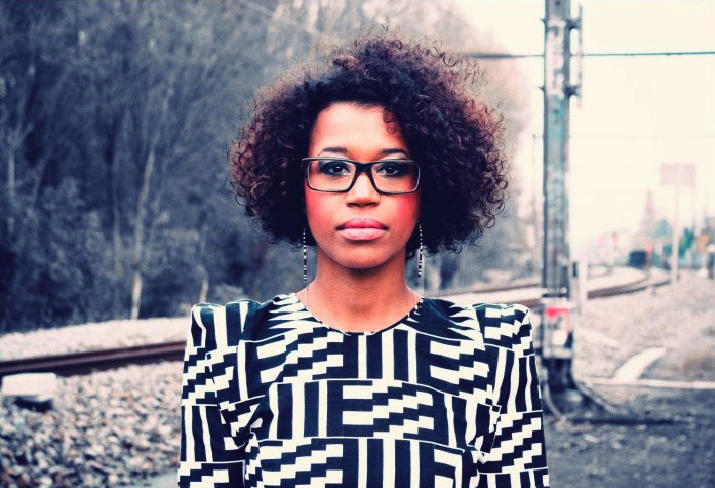
Sylvia Iweanya
Sylvia Iweanya, alias Ill-syll, a Brussels-based DJ, facilitated a workshop on the pioneer controller demystifying the hegemonic figure of the male DJ. This moment of collective learning and dancing also created new experiences and interactions between the body and the classroom.
Thursday, January 30, 2020
On the fourth day, we moved the workshops to De Markten in order to experiment with learning protocols outside the classroom. De Markten was also the venue for the public moment of restitution for the slams, text mash-ups and performances that evening.
Vibes and Leaks, Voices and Body – by Kym Ward
Kym Ward, artist and co-founder of the art residency space “The Observatory” in Liverpool, facilitated this workshop exploring bodily knowledge and voice: aged and geographic voice, sexed and gendered voice, embodied voice, voice without words, laughter.
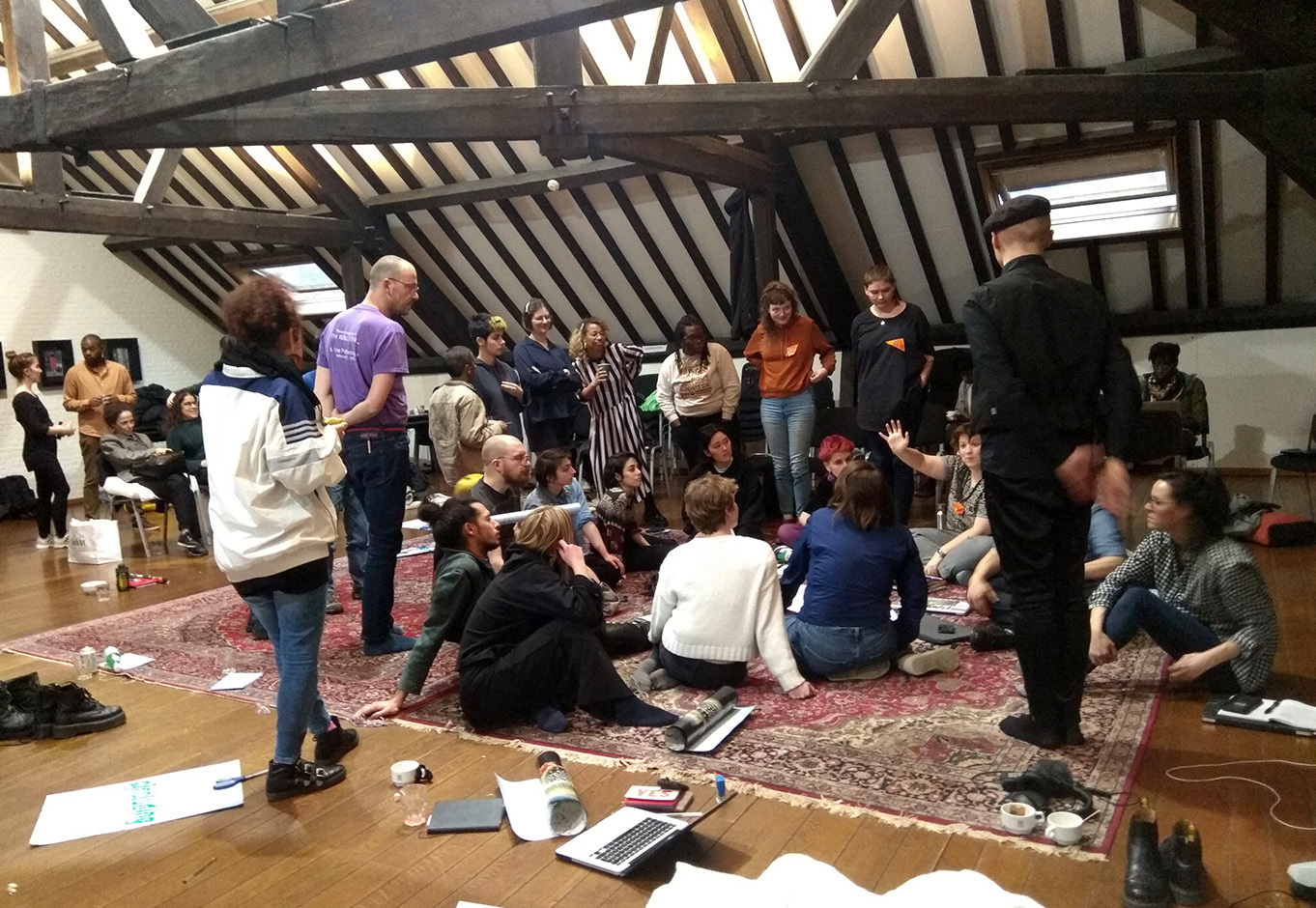
Workshop “Vibes and Leaks” facilitated by Kym Ward, De Markten, Brussels, Jan, 30 2020.
A TTTToolbox performance night with sounds from ILL-SYL
@De Markten, Brussels
Thursday evening, participants shared their reflections/claims for the week via performances testing modes of transmission as political tools: inclusive writing, non-binary languages, alternative voices, critical body – all work in progress by the TTTToolbox participants.
Joëlle Sambi Nzeba introduced the participants, while Sylvia Iweanya DJed. Artistic collaborations emerged for this moment (duos and small groups sharing concerns) touching on topics such as white supremacy, sexism in art school, European pressures on education, mother tongue, love, fragility, and magic.
Improvisation by Inga and Nino
Nonto
Yusha
Aroun
Silvain, [recording phone died half-way through]
Friday, January 31, 2020
The last day of the week was dedicated to articulating and listening to feedback and addressing the conflicts that we encountered in the group. In the afternoon we did a mapping exercise establishing topics and urgencies for the upcoming worksessions, such as “Sparring Partners” at HDK-Valand in Gothenburg (June 2020) and the week at ISBA in Besançon (September 2020). In the end, these workshops could not take place as we had imagined due to the pandemic’s effects on travel and social meetings. They eventually took place virtually.






























Selecting Participants October – November 2019
@erg, @HDK-Valand, @ISBA
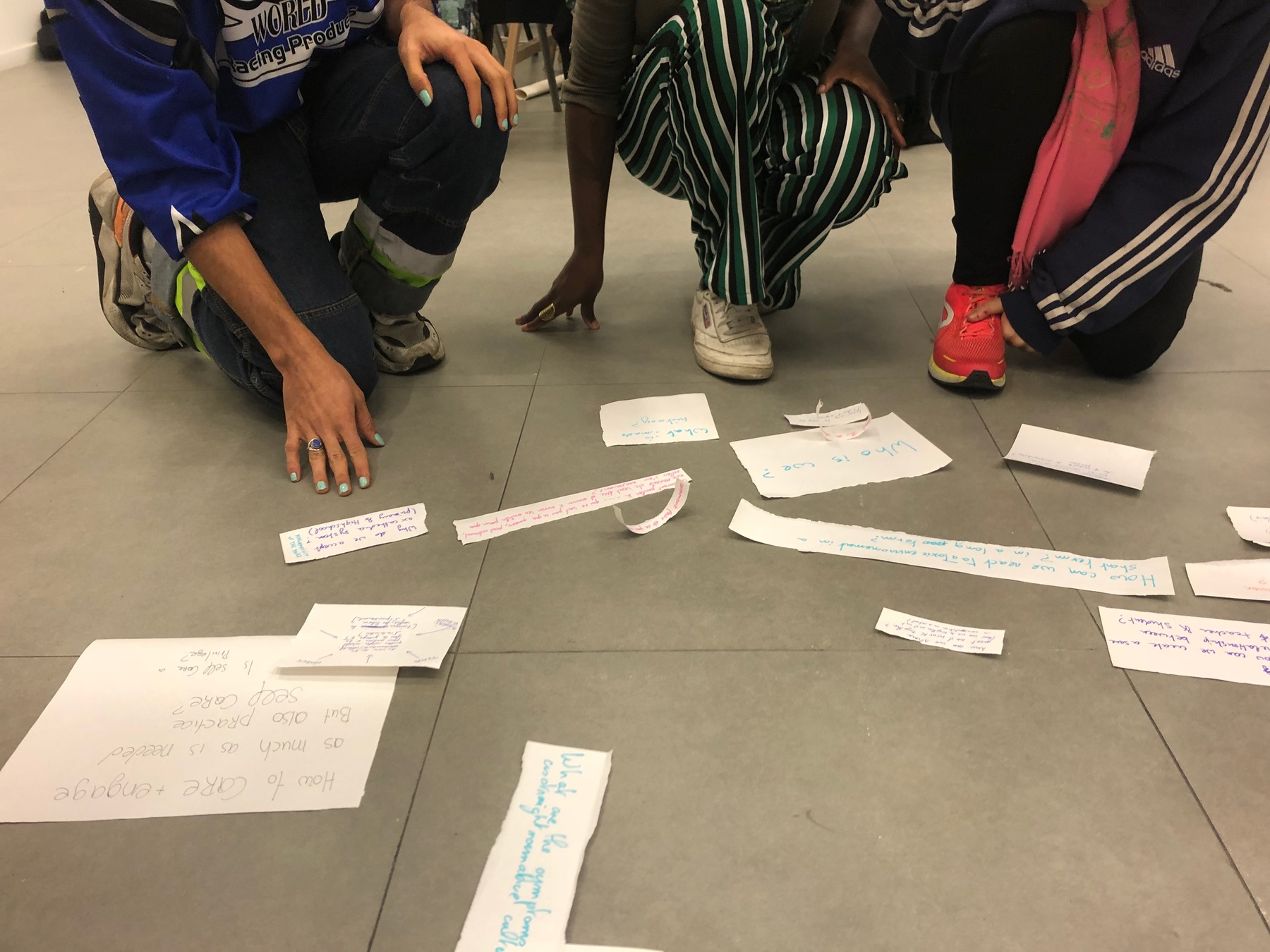
Selecting participants @erg
Launching Call for Application
October 2019
To reach potential participants, the three partner schools jointly sent out a call for applications to artists, researchers, students, teachers, and administrators from various backgrounds, fields, abilities, gender identifications, sexual orientations, ethnicities, and religions. The aim would be to collectively explore how intersectional and de-colonial approaches can activate and spread embodied and theoretical knowledges. You can read the call, which describes the application process, here:
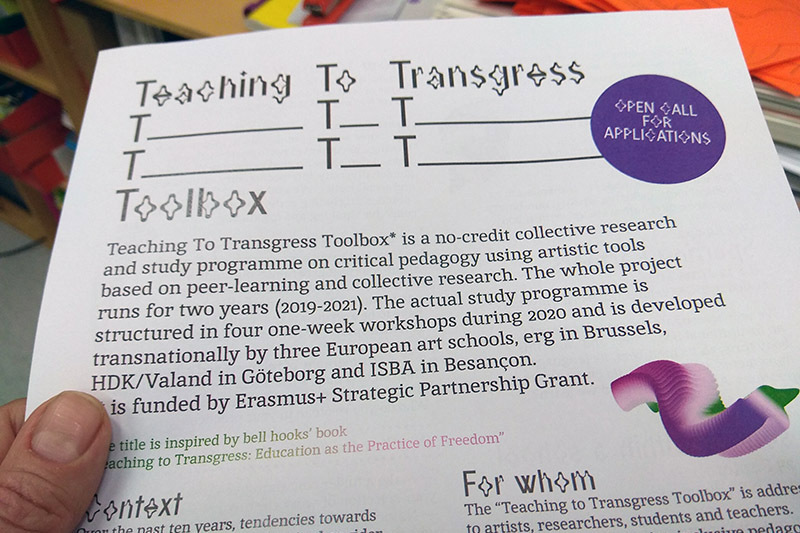
Read TTTT Open Call for Applications, English.
The interview
November 2019
Based on the applications, each school’s organizing teams invited approximately ten applicants for interview. Interviews were done both in groups (at erg, Brussels) and with individuals in conversation with a small panel (at HDK-Valand). You can read more on the particularities of the TTTToolbox admission process. You can also read the research of the “Admissions” working group investigating the powerful effects admission protocols have on widening participation. See Who gets in? Rethinking Admission – Confronting Segregation.
